#so a lot of older movies involve a completely different acting approach
Text
It's interesting to watch Marlon Brando, who's a student of method acting, opposite students of the older school
#please feel free to ignore this#I'm watching Guys and Dolls#Finally finishing this movie#Not to sound like I'm advocating for fewer female speaking parts but Adelaide didn't need to have as much screentime as she does#She seems incredibly out of place (which I mean is maybe the point?) and every song of hers except the one about her constant cold#is just like. well this certainly is happening right now#Fun fact! Method acting was invented in the '40s and wasn't particularly popular until the '50s and '60s#so a lot of older movies involve a completely different acting approach#Cary Grant initially retired from making movies because he felt there was no room for his style of acting in modern (at the time) Hollywood#(but he came back and made a few more movies at the behest of Hitchcock (I think it was Hitchcock))
1 note
·
View note
Text
How Being a Woman in Hardcore Helped Me Learn to Love Myself

Written by Jen Moglia. Graphic by Laura Cross.
Since this is my first piece written for Girls Behind the Rock Show, I figured that I should introduce myself; hi, my name is Jennifer, but most people call me Jen. I live on Long Island in New York, and my favorite things include my cats, the color pink, giving gifts to my Animal Crossing villagers, and watching sports. Above all else, however, I love music.
I frequently refer to music as the love of my life. It somehow plays a role in everything that I do. I got my first iPod when I was five years old, stacked with everything from Miranda Cosgrove and Avril Lavigne to Tool and Deftones. Some of my favorite memories growing up are sitting in my pink and purple bedroom singing and dancing along to Paramore’s crushcrushcrush and Fall Out Boy’s Thnks Fr Th Mmrs on the local alternative radio station. I danced for 12 years, played cello for seven, and am currently a wannabe ukulele rockstar after buying one on impulse and starting to teach myself how to play four years ago. Even on the simplest, barely noticeable levels, music has been everywhere in my life for as long as I can remember; even now, I can’t complete a basic task without a song playing in my headphones.
Music became an even bigger part of my life when I started attending live shows. I went to my first concerts at age 10, seeing my two favorite artists - Nickelodeon boy band Big Time Rush and classic progressive rock band Rush - within one month of each other. By the time I was 15, I had been to my fair share of arena/seated shows with one or both of my parents, from Fifth Harmony to Fitz and the Tantrums to Alice in Chains. My first general admission show was seeing the Foo Fighters at Citi Field with both my mom and dad when I was 12, but my first pop-punk general admission show (yes, they’re different) came a few years later. I had the typical list of favorite bands that you would expect from a young teenager getting into alternative music: Neck Deep, Knuckle Puck, Real Friends, and State Champs.
In late 2018, I was able to see all four of these bands for the first time, and I am a firm believer that it changed the course of my life. I met, cried-during, and eventually got the setlist for Neck Deep at Stereo Garden on Long Island in September. I sang all of “Untitled” at the barricade for Knuckle Puck at SI Hall at the Fairgrounds in Syracuse in October. I had my first minor concussion scare (yay!) before Real Friends’ set at Irving Plaza in New York City in November. Finally, I crowd surfed for the first time during State Champs’ anniversary show for The Finer Things at House of Independents in Asbury Park in December. After just a few shows, I had fallen in love with this new brand of live music that I had just been introduced too. There was something so magical to me about skin covered in sweat and Sharpie marks, feet hurting from dancing in the pit all night, and meeting strangers on line outside the venue who would become your best friends and know your deepest secrets by the end of the night.
After making some friends at all of the pop-punk shows I was going to, they started to tell me that I should get into hardcore music. I was hesitant at first - the heaviest thing I had listened to at that point was nowhere near the snippets of hardcore that my friends had played for me - but, eventually, I decided to give it a chance. I was bored and home alone with nothing to do one night over the summer of 2019 when I listened to my first hardcore album, Laugh Tracks by Knocked Loose. Immediately, I got that gut feeling that you have when you know you’ve heard one of your favorite bands for the first time. I knew that this was something special that I was meant to find at this point in my life. For the rest of the summer, I worked my way through the rest of my friends’ hardcore and hardcore-adjacent recommendations, with Cost of Living by Incendiary, Stage Four by Touche Amore, You’re Not You Anymore by Counterparts, Time & Space by Turnstile, Springtime and Blind by Fiddlehead, Smile! Aren’t You Happy by Absence of Mine, Bad to my World by Backtrack, and Reality Approaches by Harms Way being some of my favorites. By the time the next school year started, I was hooked, and I already had tickets to my first few hardcore shows in the fall.
My first hardcore show was in November 2019, seeing Knocked Loose at Webster Hall in New York City - fitting, right? They were on tour supporting their new record A Different Shade of Blue, which I had become obsessed with the minute I heard it for the first time. Although I was ridiculously scared of getting stepped on and breaking all my bones (yes, that was an actual fear of mine), I had the time of my life at that show. There was something about this newer kind of live music that prompted a cathartic release, one that I hadn’t found anywhere else before. As soon as the show was over, I was counting the days until my next one.
My love for live hardcore music (and live music and hardcore music in general) has only grown since then, and that story sort of ends there. However, I want to go back to that first hardcore band that I listened to, Knocked Loose, and the album they put out that first summer that stole my heart. I was taken by storm as soon as the first notes of A Different Shade of Blue rang through my headphones, but something was different about the third track, A Serpent’s Touch, particularly the ending; I heard a voice that sounded a little bit more like my own.
This song features Emma Boster, who does vocals for one of my favorite hardcore bands right now, Dying Wish. When I heard A Serpent’s Touch for the first time, though, I had no idea who she was. I was used to the aggressive vocal delivery of frontmen in hardcore, particularly that of Knocked Loose’s Bryan Garris, but hearing it come from her changed my perspective on a lot of things. It’s not like the song was super angry and changed its tune to be lighter once the token girl came along; in her verse, Boster sings, “I watched the venom / Overcome your spirit / Jealousy holds you now / Distorting your appearance / Bleed out.” These were lyrics that held the same intensity that the lines screamed by the men held, and they sounded just as cool coming out of her mouth. As cheesy as it sounds, it had never even occurred to me that women had a place in this new world that I had discovered. The audiences in the live videos I watched (and eventually at the shows I attended) were made up of mostly men who looked bigger and older than me. When I did start going to shows, most of the non-man population consisted of my friends and I. Emma Boster, along with so many others, began to open my eyes to the fact that a place for people like me existed in this community. It didn’t matter that I had bright red hair or liked butterflies or wore pink - I was just as much a part of this magic as the men multiple feet taller than me with tattoo-covered arms, and I belonged there just as much as they did.
As time went on and I got more involved in the genre’s music and community, I discovered more bands with women in them, and it only fueled this fire of empowerment inside of me. When I felt insecure, I’d watch live sets from Krimewatch, a hardcore band from New York City, just half an hour away from my hometown. They have multiple women as members, including their energetic badass of a vocalist, Rhylli Ogiura. Year of the Knife became one of my all-time favorites, and their bassist Madison Watkins became a serious inspiration to me; the way that she can balance killing it on stage and running the cutest, most pink apparel brand I’ve ever seen (aptly titled Candy Corpse) amazes me. Even some of the bands I’ve found more recently have had an impact on me. I started listening to Initiate last year when their EP Lavender came out, and their beautifully colorful cover art caught my eye before I had heard any of their songs. Their vocalist, Crystal Pak, is also a woman, and she’s insanely talented. Discovering this kind of representation in this new universe that I had come to feel so at home in introduced me to a world of confidence and determination that I had never known before.
When people ask me why I love hardcore so much, I often give the easy answer; “the music sounds good.” If the person allows me to ramble on for a little longer, the answer becomes much more emotional and cheesy. Hardcore taught me that speaking up for what I believe in is important, and if there’s something I’m passionate about, it’s worth shouting about. I became familiar with this when listening to one of my favorite bands ever, Incendiary (the second hardcore band I ever checked out), before quickly realizing that politics are a pretty common topic within the genre - it’s what this music was practically built on. The first time I heard their vocalist Brendan Garrone singing about police brutality and injustice on songs like Force of Neglect and Sell Your Cause, I realized that there is so much more to music than just sounding good.
However, at its core, the thing I love so much about hardcore is what it taught me about being a woman. Growing up, I was the loud girl with the personality bigger than the room who always had something to say and had a never ending supply of excitement about just about everything. As I got older, I was taught that this was not okay. People didn’t like how enthusiastic I was about everything, or that I constantly had new ideas and new discoveries I wanted to talk about. As cliche as it sounds, I felt like everyone around me was trying to dull my sparkle, especially some of the men that I was encountering on a day-to-day basis. Even when I started to come to terms with my big and bright personality, in turn also coming to terms with my own femininity, I was told that this wasn’t how girls acted. I had to pick one - I could watch Disney princess movies and wear Hello Kitty hair clips, or I could be outspoken about my beliefs; but never both. The women that I mentioned earlier, along with so, so many more, helped me unlearn these toxic mindsets. Seeing someone like Emma Boster take the stage and scream ferociously for a full set helped me see that I could be a girl and still be a powerhouse. Following Madi Watkins around on social media showed me that I could love bands like Year of the Knife and also love heart-shaped purses and wear pink from head to toe. My aggression and passion didn’t make me any less of a woman, and my femininity didn’t make me any less of a force to be reckoned with.
So, at the end of this love letter to hardcore and the women who run it, I say this; thank you for teaching me that I don’t have to shrink myself anymore. It has made a world of a difference.
29 notes
·
View notes
Link
The Crown Is One Of The Hardest Shows To Cast. Here’s How They Do It.

Casting announcements for The Crown are almost as exciting as the premiere of a new season itself. Half the fun of the show is analyzing the actors set to portray famous figures like Princess Diana and Margaret Thatcher, as well as who will next fill the storied shoes of Queen Elizabeth. Season 4 of Peter Morgan’s royal drama was cast by Robert Sterne, who' won several Emmys for his work on the series along with Nina Gold (the duo cast seasons 1 through 3 together, and they were also responsible for the influx of talent we saw on Game of Thrones). Unsurprisingly, casting The Crown poses specific challenges not experienced on any other show.
“It’s not only that you’ve got to find actors who can successfully embody real-life, well-known people, but you’ve got to make sure there’s a continuity as it’s passed from the younger to the older version of the actor,” Sterne tells ELLE.com. “Who’s done it before, who’s doing it after, and who are the real people?”Sterne, who's currently in the process of re-casting the entire series for seasons 5 and 6, adds, “It’s nerve-wracking because people invest in the original people. You do X hours of screen time with them and fall in love with their interpretation, and then you go again [and re-cast] every two years.
”The casting process for each season starts about a year before filming begins; a meeting with Morgan clarifies where the characters will be in their journeys the following season. There were 262 speaking characters in season 4, and Sterne personally worked on all of them. The casting director notes that “you’ve got to think ahead of the game,” and that there are several factors to consider—not just whether the actor looks like the real-life person.
“They’ve got to have some credibility, physically, to be the people they’re supposed to portray,” Sterne notes. “But at the same time, they’ve got to get the spirit of it right.” Below, Sterne breaks down the behind-the-scenes process of building the cast of The Crown.
Perfecting Princess Diana

Photo: Des Willie/Netflix
“Diana was a big deal,” Sterne says, confirming the role has been The Crown’s biggest casting challenge to date. “It was clear as we were heading into the 1980s that she was going to be a major part of it. And we’re starting with Diana at the beginning of her life—we’re not trying to find the icon of the Mario Testino images.”
The casting team embarked on an international search for the person who would play Diana, looking at hundreds of possible actresses in the U.S., U.K., and Australia. They weren’t just auditioning professional actors, either. “It was completely open,” Sterne notes. “We were going into schools in the home countries to see if there was anybody who might be good, since we meet her at 16, as well as looking at people who'd done a lot more work.”
The massive search brought them back to Emma Corrin, whom Sterne had seen in the casting process for season 3. The tense lunch between Camilla Parker-Bowles (Emerald Fennell) and Diana in the third episode of season 4 was used as the audition scene for Camilla—and Corrin came in as a reader to stand in for the part of Diana.
youtube
“I usually read in all these meetings, but we decided because it was this major scene that we would get somebody to come in [for Diana],” Sterne explains. “We asked Emma to come in, not thinking about casting Diana at this point. But as she was reading with these Camillas, all the directors and the showrunner were looking more at her and not at the people playing Camilla—who will remain nameless, of course. When we got to thinking about Diana a year later, there she was in my notes.”
Bringing in Margaret Thatcher
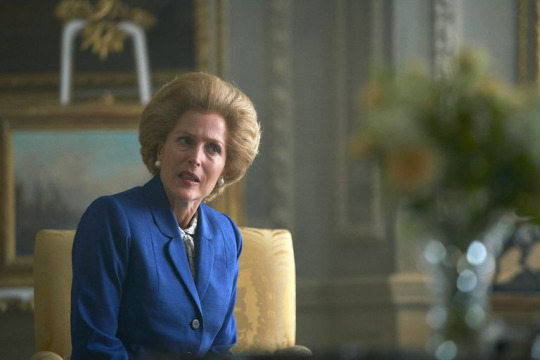
Photo: Des Willie/Netflix
Sterne was told early on that the big focus for season 4 would be the three main women: the queen, Diana, and Margaret Thatcher. Casting Thatcher, who has been portrayed repeatedly onscreen in the past, was unusual, because actress Gillian Anderson is Morgan’s partner, and the creator himself approached her about the role.
“There was always a list of one,” Sterne says. “We had thought of ideas and talked it through a lot, but we always knew Gillian Anderson was totally amazing. It seemed like a fresh and interesting way of going. We were very lucky she said she’d do it—she’s such a clever character actress.”
While Anderson is a fairly big name, Sterne and Gold aren’t always looking for an A-list star to be part of The Crown. Having someone like Anderson come in is balanced by casting lesser-known actors like Corrin.
“One of the great joys of working on it—and working with Peter Morgan on it—is that we’re open, and it’s a really genuine opportunity to find the best person for the part,” Sterne says. “We get to find the actor we believe has the best skills and the best instinctive connection with the part, rather than feeling like we’ve got to provide big names all the time.”
Carrying Charles Through

Photo: Des Willie/Netflix
“He’s so three-dimensional,” Sterne explains of the role of Prince Charles. “There are so many aspects to that character. He would have to go on a journey.” It was important that the actor could evolve over a two-decade period, playing both a young version and the one who closes out season 4.
Josh O’Connor's work in Francis Lee’s 2017 film God’s Own Country led Sterne to cast him as Prince Charles. “He totally inhabited the role in God’s Own Country in this beautiful performance that’s very different from who he is. We thought, ‘Gosh, if that guy can do that and run with a character who’s so different than himself, then that will be interesting to see.’ As soon as we started [working with] him, it became pretty clear it was Josh.”
O’Connor has the obvious physical similarity to Charles, particularly in the ears, but Sterne really wanted someone who could make the role their own and not just mimic a famous figure—something especially important to season 4’s arc.
“It’s really important that you’re not getting an impersonation,” Sterne notes. “They have to embody them. We have an amazing team who help with the voice work and the movement work—those technical aspects—but you want somebody who has the skill to take on all that technically, and then leave it all behind. Josh flew with that from the moment he came into the room.”
Finding Young William and Harry
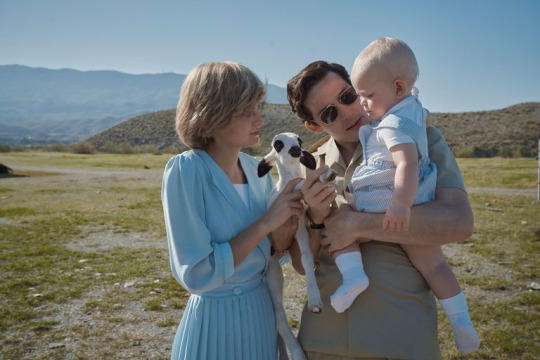
Photo: Des Willie/Netflix
Princes William and Harry make their debut in season 4 as young children, and the resemblance to the real royals is almost uncanny. A baby version of William shows up in episode 6 as Charles and Diana tour Australia and New Zealand in 1982, while Harry appears later in the season. Unlike with the older royals, Sterne focuses on physical appearance alone when casting the kids.
“They have to be as recognizable as possible,” he explains. “They don’t have the opportunity to say many lines, so it’s all visual. You want people to have the pleasure of going, ‘Ah, there they are!’”
Sterne says the difficulty in casting children can vary depending on the situation. The search involves looking through schools in the U.K. and visiting drama groups for kids. “You have to keep going until you find people who feel credible,” Sterne says.
Casting One-Off Characters and Extras
While the fourth season of The Crown focuses a lot on Charles and Diana's relationship and Thatcher’s rapport with the queen, several standalone episodes bring in one-off characters who are equally important to the narrative.
Episode 7, “The Hereditary Principle,” sees Princess Margaret learning that the royal family’s estranged cousins have been locked in a mental institution. The women, Nerissa and Katherine Bowes-Lyon, were first cousins to Elizabeth II on her mother’s side and both had severe learning disabilities. Sterne and Gold cast Trudie Emery as Katherine and Pauline Hendrickson as Nerissa. Both actresses have learning disabilities in real life.
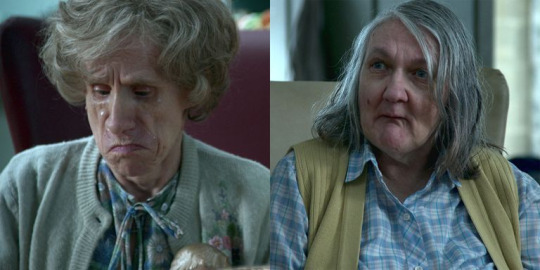
Trudie Emery as Katherine Bowes-Lyon and Pauline Hendrickson as Nerissa Bowes-Lyon in The Crown season 4 episode 7, "The Hereditary Principle".
NETFLIX
“We had a few pictures of those two women and did a lot of research into their lives and experiences, and then did a national search across drama schools and residential care homes to find people with learning disabilities who looked similar to the real women and were interested in acting,” Sterne says. “We employed a lot of the people with learning disabilities we met along the way and put them in small parts in those scenes with Trudie and Pauline. We wanted to find real people with learning disabilities so they were properly represented. There are not as many opportunities as you’d hope for, and when we started looking around, there were so many drama groups. There’s so much talent out there.”
Similarly, in episode 5, Tom Brooke plays real-life British man Michael Fagan, who broke into Buckingham Palace to see the queen—a key moment in understanding the state of England in the 1980s.
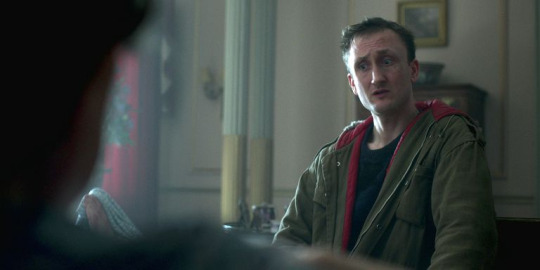
Tom Brooke as Michael Fagan in The Crown season 4 episode 5, "Fagan".
NETFLIX
“We knew there was going to be an episode about him,” Sterne says, “and I remember reading stories about him and there were loads of pictures of him. For a character like that, you look at footage of him and read about him. It’s a really extraordinary part to play, so you want to find an accomplished, technically brilliant actor who looks a bit like him. Tom is an actor with a whole lot of soul, and you wanted [Fagan] to have a whole lot of soul.”
Sterne adds, “Fagan's story was a way of exploring Thatcher’s Britain that's not automatically going to be covered if you’re just dealing with the royal family and the prime ministers, which is the usual core of The Crown.”
61 notes
·
View notes
Photo
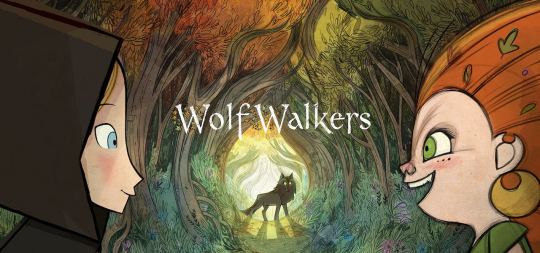
Wolfwalkers Review
I confess, I have not taken the time to watch the first two movies of Cartoon Saloon’s Irish folklore trilogy (a fact I hope to rectify sooner rather than later). But I did take the time to watch Wolfwalkers...and I fell in love. The animation, the unique style, the music, the story...it was all beautiful. So I thought I’d give my thoughts on it, trying to keep them as spoiler free as I can.
Wolfwalkers had a limited theatrical release and was later released on Apple TV’s streaming service--which does offer a one week free trial if you want to check out their content. It is not the first Cartoon Saloon animation I’ve seen (I watched Breadwinner a few years ago), but it is easily the most beautiful. Being of Irish descent myself, I’m always happy to see good stories set in the lands of my ancestors. Especially stories that make liberal use of Celtic style music. If you have a Celtic heritage you’d like to explore, Wolfwalkers is an excellent celebration of that heritage and worth watching for that alone.
The story
The plot is fairly simplistic: A girl moves to a new town and has a hard time adjusting, meets a friend who stands out just as much as she does, discovers that friend faces a terrible threat, and tries to do whatever she can to help her friend. In this story, Robyn Goodfellowe and her father Bill have moved from northern England to Kilkenny, Ireland (insert South Park joke here). Bill is a hunter, tasked by Lord Oliver Cromwell, who insists on being referred to as Lord Protector and nothing less, with eradicating the wolves who live in the nearby forest so that the woodcutters can clear the forest for farmland. Well, the wolves in the forest have something to say about that. While trying to prove to her father that she can still be a good hunter despite Cromwell’s wishes that she stay in town and work in the scullery, Robyn comes across a girl named Mebh, who reveals herself to be a wolfwalker; a type of werewolf, for lack of a better term, that takes a wolf form whenever her human body sleeps. After a misunderstanding, Mebh accidentally bites Robyn, causing Robyn to become a wolfwalker herself. But her new form makes her an ally to Mebh, who is waiting for her missing mother to return so they can take their wolf pack and find a new forest untouched by Cromwell. Robyn struggles to keep her new secret form from her father and Cromwell, but when Cromwell threatens the wolves and Mebh directly, Robyn can no longer remain silent.
Cartoon Saloon’s history of giving their stories bittersweet endings makes this plot a little less predictable than it would be if it came from any other studio--and a lot less predictable than if it came from Disney (I love Disney, but sometimes they play things too safe or too true to their own favorite tropes). But the ending is quite satisfactory. It did suffer the plot mandated friendship failure in the third act, but to be fair, Robyn’s heart was in the right place, even if her actions weren’t. This film proves that a story doesn’t have to have a bunch of plot twists or be especially complex to be good. There is an elegance in simplicity.
The characters
Robyn is spunky, independent, snarky and skilled in marksmanship. She understandably does not like the new “cage” she’s found herself in under Cromwell’s strict rules. In England, her father let her go hunting with him and gave her a lot more freedom. In Ireland, he is firmly under Cromwell’s thumb. And as Cromwell is not afraid to punish children as if they were adults, Bill fears Robyn will be taken away from him and jailed or put in the stocks. Robyn has started to hear the phrase, “It’s for your own good,” far more often than anything else from her father, and she can’t stand it--right up until she uses the same phrase toward Mebh to protect her from Cromwell. When she becomes a wolfwalker, she suffers anxiety, wanting to hide her wolf form, but also craving freedom more than ever. Robyn is the type of idealist who always imagines herself easily taking a stand against something she believes to be wrong, but when it comes right down to doing just that, she balks at first. But in the end, she is able to stand strong anyway. Even as a child, Robyn shows strong leadership skills and has a mind for strategy--when she’s calm and focused, that is. When she’s out of her element and panicking, she gets herself into quite a few predicaments. Her strengths and flaws make her a well rounded character and prevent her, a young, falcon-owning huntress in 1650 Ireland, from sliding into Mary Sue territory.
Mebh is your standard wild child. She’s fiercely independent, loves to tease, and tends to make bombastic threats toward people who might offend her. She’s at least a few years younger than Robyn, and it shows. Robyn is 12-13 years old, while Mebh seems to be about nine at the most. Mebh takes promises seriously, expects them to be upheld, and is easily hurt when they are broken. Despite having little in common with Robyn, she bonds easily with her within hours of meeting her, teaching her all that she needs to know about being a wolfwalker. She’s a handful for anyone, a fact that baffles Cromwell, who apparently has very little personal experience with children. Kids Mebh’s age are often portrayed as seeming older or younger than they are, but Mebh is portrayed as a very convincing nine-year-old. She’s properly immature, but also old enough to take care of herself while her mother is away. Though she does have over two dozen furry babysitters to take care of her.
Bill Goodfellowe represents the rare Sean Bean role where his character doesn’t die. He’s a widower who is just trying to establish a good life for himself and Robyn. When he gets called to Ireland, he finds himself having to tie down his free spirited daughter, and it’s plain to see he hates doing it. He wants to protect her from the wolves around Kilkenny, but he also wants to protect her from Cromwell’s retribution against anyone who violates his dictatorial laws. Eventually, he has to stand up to Cromwell to protect Robyn, finally realizing that complying with tyranny will not allow him to protect his daughter; it will only put his daughter in more danger.
There’s not much to say about Mebh’s mother Moll. Her whereabouts are unknown until halfway through the second act, and even in the third act she doesn’t play much of a role. She’s a tough but tender matriarch who acts as something of a living MacGuffin. She's also the plot’s punching bag.
The side characters are mostly delightful. Merlin is your standard animal sidekick, but he’s also a very useful means of communicating, being a bird that can talk to Wolfwalkers. A bully named Paidrig turns out to be a useful tool for Robyn, keeping him from being completely repulsive (but only just barely; I’d rank him just below Eustace Clarence Scrubb in the first half of VDT). And Sean Og is criminally underappreciated. Seriously, we need some more love for Sean Og here.
And as for Oliver Cromwell, I have quite a bit to say about him. I’m going to save that for its own post, since it will involve spoilers. Since he is a historical domain character (unlike the others), the approach taken with him was different from what it was for the other antagonistic characters--and for a lot of villains in general. He’s almost Judge Claude Frollo in John Ratcliffe’s body.
The soundtrack
With an abundance of gorgeous Celtic music and a beautifully fitting rendition of “Running with the Wolves” by Aurora, I have only one complaint about the soundtrack: I CANNOT FIND IT FOR SALE ANYWHERE!!!
In summary
It’s beautiful, it’s so very Irish, it’s a quality story about magic wolves (those are rare), and I sincerely believe it is more than a contender for best animated feature this year. Honestly, I liked it better than Soul. Well done, Cartoon Saloon. Well done. Now, to all of you reading this, go support Wolfwalkers!
#Wolfwalkers#review#Cartoon Saloon#animation#Robyn Goodfellowe#Mebh og MacTire#seriously if you know where to find the soundtrack for sale or safe download please tell me
38 notes
·
View notes
Photo
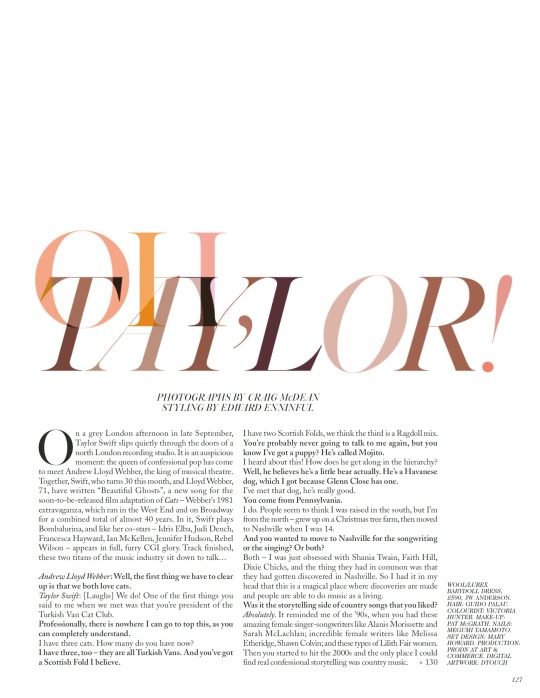
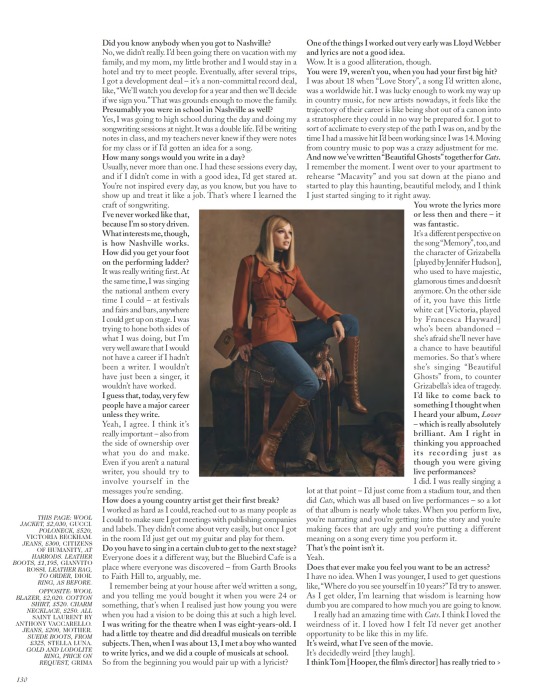
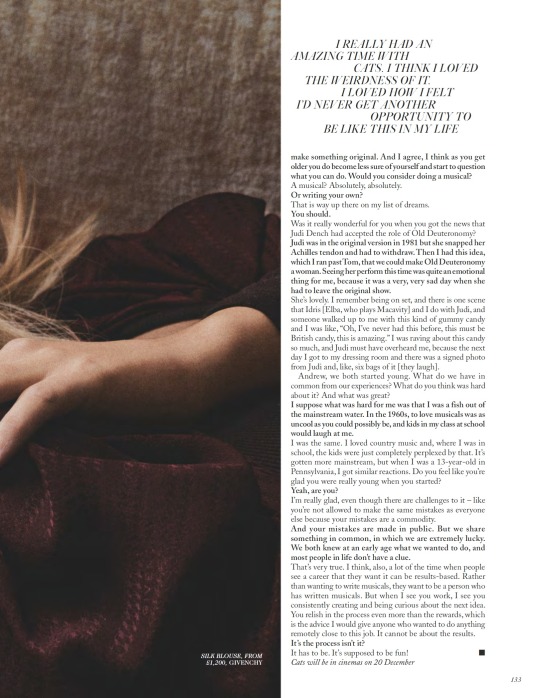
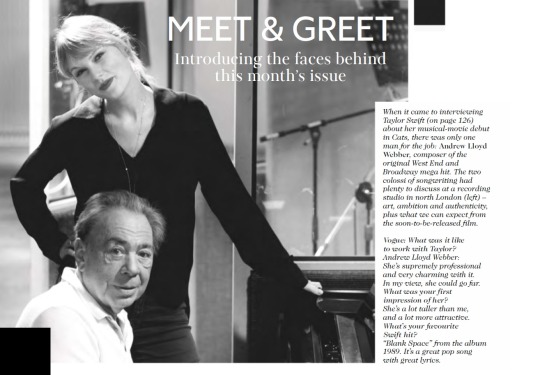
OH, TAYLOR! Taylor Swift On Side-Stepping Into Acting, Owning What You Make & Loving The “Weirdness” Of Cats
On a grey London afternoon in late September, Taylor Swift slips quietly through the doors of a north London recording studio. It is an auspicious moment: the queen of confessional pop has come to meet Andrew Lloyd Webber, the king of musical theatre. Together, Swift, who turns 30 this month, and Lloyd Webber,
71, have written “Beautiful Ghosts”, a new song for the soon-to-be-released film adaptation of Cats – Webber’s 1981 extravaganza, which ran in the West End and on Broadway for a combined total of almost 40 years. In it, Swift plays Bombalurina, and like her co-stars – Idris Elba, Judi Dench, Francesca Hayward, Ian McKellen, Jennifer Hudson, Rebel Wilson – appears in full, furry CGI glory. Track finished, these two titans of the music industry sit down to talk…
Andrew Lloyd Webber: Well, the first thing we have to clear up is that we both love cats.
Taylor Swift: [Laughs] We do! One of the first things you said to me when we met was that you’re president of the Turkish Van Cat Club.
ALW: Professionally, there is nowhere I can go to top this, as you can completely understand.
TS: I have three cats. How many do you have now?
ALW: I have three, too – they are all Turkish Vans. And you’ve got a Scottish Fold I believe.
TS: I have two Scottish Folds, we think the third is a Ragdoll mix.
ALW: You’re probably never going to talk to me again, but you know I’ve got a puppy? He’s called Mojito.
TS: I heard about this! How does he get along in the hierarchy?
ALW: Well, he believes he’s a little bear actually. He’s a Havanese dog, which I got because Glenn Close has one.
TS: I’ve met that dog, he’s really good.
ALW: You come from Pennsylvania.
TS: I do. People seem to think I was raised in the south, but I’m from the north – grew up on a Christmas tree farm, then moved to Nashville when I was 14.
ALW: And you wanted to move to Nashville for the songwriting or the singing? Or both?
TS: Both – I was just obsessed with Shania Twain, Faith Hill, Dixie Chicks, and the thing they had in common was that they had gotten discovered in Nashville. So I had it in my head that this is a magical place where discoveries are made and people are able to do music as a living.
ALW: Was it the storytelling side of country songs that you liked? Absolutely. It reminded me of the ’90s, when you had these amazing female singer-songwriters like Alanis Morissette and Sarah McLachlan; incredible female writers like Melissa Etheridge, Shawn Colvin; and these types of Lilith Fair women. Then you started to hit the 2000s and the only place I could find real confessional storytelling was country music.
ALW: Did you know anybody when you got to Nashville?
TS: No, we didn’t really. I’d been going there on vacation with my family, and my mom, my little brother and I would stay in a hotel and try to meet people. Eventually, after several trips, I got a development deal – it’s a non-committal record deal, like, “We’ll watch you develop for a year and then we’ll decide if we sign you.” That was grounds enough to move the family.
ALW: Presumably you were in school in Nashville as well?
TS: Yes, I was going to high school during the day and doing my songwriting sessions at night. It was a double life. I’d be writing notes in class, and my teachers never knew if they were notes for my class or if I’d gotten an idea for a song.
ALW: How many songs would you write in a day?
TS: Usually, never more than one. I had these sessions every day, and if I didn’t come in with a good idea, I’d get stared at. You’re not inspired every day, as you know, but you have to show up and treat it like a job. That’s where I learned the
craft of songwriting.
ALW: I’ve never worked like that, because I’m so story driven. What interests me, though, is how Nashville works. How did you get your foot on the performing ladder?
TS: It was really writing first. At the same time, I was singing the national anthem every time I could – at festivals and fairs and bars, anywhere I could get up on stage. I was trying to hone both sides of what I was doing, but I’m very well aware that I would not have a career if I hadn’t been a writer. I wouldn’t have just been a singer, it wouldn’t have worked.
ALW: I guess that, today, very few people have a major career unless they write.
TS: Yeah, I agree. I think it’s really important – also from the side of ownership over what you do and make. Even if you aren’t a natural writer, you should try to
involve yourself in the messages you’re sending.
ALW: How does a young country artist get their first break?
TS: I worked as hard as I could, reached out to as many people as I could to make sure I got meetings with publishing companies and labels. They didn’t come about very easily, but once I got in the room I’d just get out my guitar and play for them.
ALW: Do you have to sing in a certain club to get to the next stage?
TS: Everyone does it a different way, but the Bluebird Cafe is a place where everyone was discovered – from Garth Brooks to Faith Hill to, arguably, me.
I remember being at your house after we’d written a song, and you telling me you’d bought it when you were 24 or something, that’s when I realised just how young you were when you had a vision to be doing this at such a high level.
ALW: I was writing for the theatre when I was eight-years-old. I had a little toy theatre and did dreadful musicals on terrible subjects. Then, when I was about 13, I met a boy who wanted to write lyrics, and we did a couple of musicals at school.
TS: So from the beginning you would pair up with a lyricist?
ALW: One of the things I worked out very early was Lloyd Webber and lyrics are not a good idea.
TS: Wow. It is a good alliteration, though.
ALW: You were 19, weren’t you, when you had your first big hit?
TS: I was about 18 when “Love Story”, a song I’d written alone, was a worldwide hit. I was lucky enough to work my way up in country music, for new artists nowadays, it feels like the trajectory of their career is like being shot out of a canon into a stratosphere they could in no way be prepared for. I got to sort of acclimate to every step of the path I was on, and by the time I had a massive hit I’d been working since I was 14. Moving from country music to pop was a crazy adjustment for me.
ALW: And now we’ve written “Beautiful Ghosts” together for Cats.
TS: I remember the moment. I went over to your apartment to rehearse “Macavity” and you sat down at the piano and started to play this haunting, beautiful melody, and I think I just started singing to it right away.
ALW: You wrote the lyrics more or less then and there – it was fantastic.
TS: It’s a different perspective on the song “Memory”, too, and the character of Grizabella [played by Jennifer Hudson], who used to have majestic, glamorous times and doesn’t anymore. On the other side of it, you have this little white cat [Victoria, played by Francesca Hayward] who’s been abandoned – she’s afraid she’ll never have a chance to have beautiful memories. So that’s where she’s singing “Beautiful Ghosts” from, to counter Grizabella’s idea of tragedy.
ALW: I’d like to come back to something I thought when I heard your album, Lover – which is really absolutely brilliant. Am I right in thinking you approached its recording just as though you were giving live performances?
TS: I did. I was really singing a lot at that point – I’d just come from a stadium tour, and then did Cats, which was all based on live performances – so a lot of that album is nearly whole takes. When you perform live, you’re narrating and you’re getting into the story and you’re making faces that are ugly and you’re putting a different meaning on a song every time you perform it.
ALW: That’s the point isn’t it.
TS: Yeah.
ALW: Does that ever make you feel you want to be an actress?
TS: I have no idea. When I was younger, I used to get questions like, “Where do you see yourself in 10 years?” I’d try to answer. As I get older, I’m learning that wisdom is learning how dumb you are compared to how much you are going to know. I really had an amazing time with Cats. I think I loved the weirdness of it. I loved how I felt I’d never get another opportunity to be like this in my life.
ALW: It’s weird, what I’ve seen of the movie.
TS: It’s decidedly weird [they laugh].
ALW: I think Tom [Hooper, the film’s director] has really tried to make something original. And I agree, I think as you get older you do become less sure of yourself and start to question what you can do. Would you consider doing a musical?
TS: A musical? Absolutely, absolutely.
ALW: Or writing your own?
TS: That is way up there on my list of dreams.
ALW: You should.
TS: Was it really wonderful for you when you got the news that Judi Dench had accepted the role of Old Deuteronomy?
ALW: Judi was in the original version in 1981 but she snapped her Achilles tendon and had to withdraw. Then I had this idea, which I ran past Tom, that we could make Old Deuteronomy a woman. Seeing her perform this time was quite an emotional thing for me, because it was a very, very sad day when she had to leave the original show.
TS: She’s lovely. I remember being on set, and there is one scene that Idris [Elba, who plays Macavity] and I do with Judi, and someone walked up to me with this kind of gummy candy and I was like, “Oh, I’ve never had this before, this must be British candy, this is amazing.” I was raving about this candy so much, and Judi must have overheard me, because the next day I got to my dressing room and there was a signed photo from Judi and, like, six bags of it [they laugh].
Andrew, we both started young. What do we have in common from our experiences? What do you think was hard about it? And what was great?
ALW: I suppose what was hard for me was that I was a fish out of the mainstream water. In the 1960s, to love musicals was as uncool as you could possibly be, and kids in my class at school would laugh at me.
TS: I was the same. I loved country music and, where I was in school, the kids were just completely perplexed by that. It’s gotten more mainstream, but when I was a 13-year-old in Pennsylvania, I got similar reactions. Do you feel like you’re glad you were really young when you started?
ALW: Yeah, are you?
TS: I’m really glad, even though there are challenges to it – like you’re not allowed to make the same mistakes as everyone else because your mistakes are a commodity.
ALW: And your mistakes are made in public. But we share something in common, in which we are extremely lucky. We both knew at an early age what we wanted to do, and most people in life don’t have a clue.
TS: That’s very true. I think, also, a lot of the time when people see a career that they want it can be results-based. Rather than wanting to write musicals, they want to be a person who has written musicals. But when I see you work, I see you consistently creating and being curious about the next idea. You relish in the process even more than the rewards, which is the advice I would give anyone who wanted to do anything remotely close to this job. It cannot be about the results.
ALW: It’s the process isn’t it?
TS: It has to be. It’s supposed to be fun!
MEET & GREET: Introducing the faces behind this month’s issue
When it came to interviewing Taylor Swift about her musical-movie debut
in Cats, there was only one man for the job: Andrew Lloyd Webber, composer of the original West End and Broadway mega hit. The two colossi of songwriting had plenty to discuss at a recording studio in north London – art, ambition and authenticity, plus what we can expect from the soon-to-be-released film.
Vogue: What was it like to work with Taylor?
Andrew Lloyd Webber: She’s supremely professional and very charming with it. In my view, she could go far.
Vogue: What was your first impression of her?
ALW: She’s a lot taller than me, and a lot more attractive.
Vogue: What’s your favourite Swift hit?
ALW: “Blank Space” from the album 1989. It’s a great pop song with great lyrics.
980 notes
·
View notes
Text
RJC’s review of: A Number
I’d like to start by apologising for the continued use of the almost-pun “A Number” but in my defence... Caryl Churchill started it.
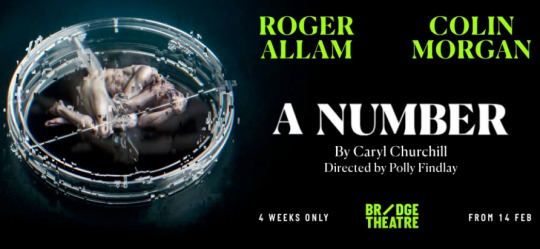
There are A Number of things one can look forward to in Polly Findlay’s production of “A Number” at The Bridge theatre and just three of them are Colin Morgan. Fangirls can delight that Colin’s stealth stage door exit skills have FINALLY been put to their stunning first use on stage. Colin plays three different characters with about six to eight costume changes in the space of an hour. He disappears and reappears completely anew and it is magnificently seamless.
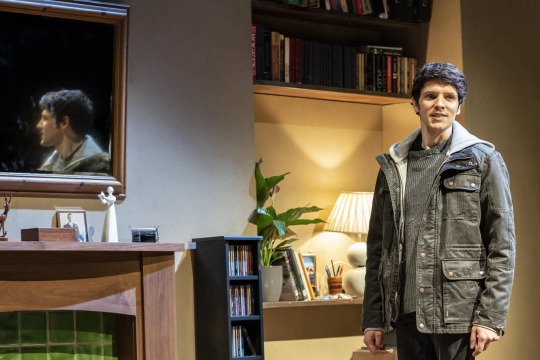
When I first read the play I had A Number of concerns. Maybe I’m an old fashioned kind of gal but I prefer sentences to begin AND end. I’m greedy like that. I found the play far too difficult a read and I was somewhat apprehensive about the production. Fortunately, I see the text benefits from performance as Roger Allam and Colin Morgan breathe something reminiscent of natural into those lines. I tip my imaginary hat to them as well, remembering that stuff must be tricky, the majority of these lines don’t follow a natural structure and tripping on the lines would weaken the effect.
I am not completely sold on this effect to be honest. It cries device to me and distances this tale from pertinence. “She was one of those people, when they say there has been a person under a train” is a good example. WHO EVER says that? Ever? Nobody. I’m a great lover of words but apparently I don’t like them in this particular order. I never was one for the abstract. Be prepared for a little abstract.
Colin’s nasal and fumbling B2 makes a lot more sense in person than I could have ever anticipated when reading. A Number is obviously not quite my cup of tea shall we say but it is becoming an increasingly tolerable piece thanks to the efforts of this production. It’s an intriguing story. A failed father seeks a fresh start, sends his son into care but not before cloning him, as “tribute”. Written just as cloning became a legitimate thing it’s pushing at big relevant buttons but for my money it’s a paper thin approach. It’s definitely a conversation piece though, a trigger of questions, forcing you to think and figure the thing out. If you can be bothered to meet it half way and you kinda have to.
A Number is another “sins of the fathers” type narrative in which Salter, the father, cannot break the cycle of his own ineptitude and selfishness. A price his sons inevitably will have to pay. I won’t give that price away but it makes for a sad little story. Some emphasis on little. When it could have been bigger (that’s what she said).
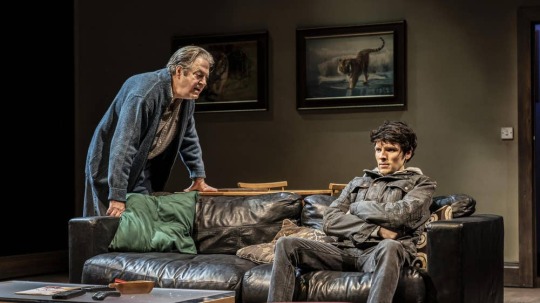
A Number hits a number of notes in its short duration. It’s kinda funny, it’s even kinda cute (maybe that’s just Colin), it’s kinda sad, kinda creepy, kinda cruel and ultimately super dark.

Roger Allam and Colin Morgan pull out of the bag a rather lovely and truly unforgettable chemistry as father and sons. I’m not quite used to seeing Allam as the “little man”. His appearance is entirely ordinary and as a character he’s far from powerful or noble. For a man usually possessed of scene stealing charisma, Allam fearlessly relished in the grim and pitiful. He’s squirming from the beginning to the end. Trying to contain the anger of his first son, trying to contain the disappointment of his second son and in the final act, trying to salvage some scrap of meaning or importance from one beautifully blasé last (of 19) hopes. Allam’s physicality when B1 is on stage is intriguing to watch as he screams fear and seeks distance. His tone when B2 is on stage almost convinces you of wholesomeness and genuine love. Salter is quite an understated journey but enjoy as Allam hits every single note of it in true masterclass fashion.

One could marvel for A Number of hours about how amazing the stage is for this production. The first night, when the room completely changed angle, my eyes widened like a kid in a Colin Morgan-themed Candy store! WOW. It messed with my mind so much that I was second guessing everything. What they can do nowadays is awesome. I still don’t quite get how it all works and where exactly Colin escapes to in-between but... that’s the magic of theatre for you.
I’m also a big fan of the 90s kinda feel. The stack tables, the CD tower, the TV stand, the landline phone! It’s soooooo 90s I keep expecting to hear Hanson’s MMM Bop playing upstairs or something. I feel like I’m a teenager again, at my friends’ house and it’s all kicking off between her hot older brother and his step-dad again. Flashbacks....

My only criticism with the whole set change thing is the decision to blast some crazy sounds at you for their duration. It’s like watching a crappy horror movie with jump scares that don’t lead anywhere. It’s not particularly satisfying and ones patience for it tends to wear thin. Especially when everyone around you likes to gasp and yelp every time it happens. Personally, not sure why nobody just took my advice of playing Bjork’s “Army of Me” in-between the set changes. I’ve only got an entire playlist of suggestions but whatever. You know better. I suppose it might wake the odd theatre sleeper.
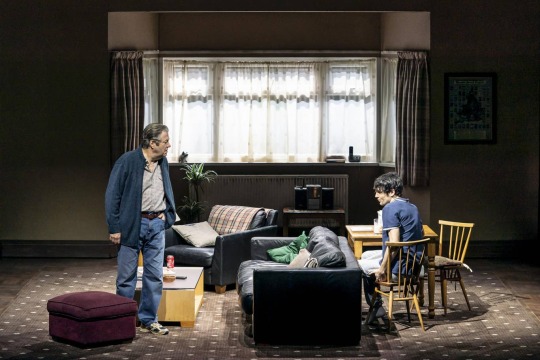
Can I talk about Colin Morgan now?
I feel like A Number is a bit of a showcase of everything Colin can do (and do better than anyone else). He’s got the skills for comedy, for brutality, for tears and not to mention his signature LIMITLESS energy. As his self-elected number one fangirl I will quite happily sit there and bask in the pride as he totally nails this whole thing.
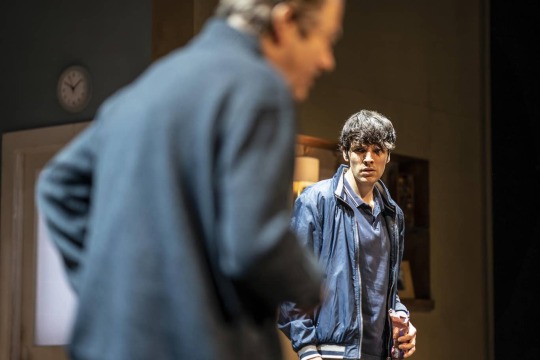
Colin’s three characters are all quite different. One might easier refer to them as Benjamin, Leo and... well... Michael. B2 is adorable in his almost whiney tone and sounds possibly too much like Yasmin in “Worldship Humility” accent (for my liking). I keep expecting him to start calling people goat fucking somethings but so far he’s not done it. His twitchy, stiff awkwardness is reminiscent of Benjamin but that’s about it.
B1 isn’t exactly Leo-like, he’s far too efficient for that, he just STRANGELY ENOUGH looks A LOT like him. The hoodie and denim don’t help. He’s got that similar breaking point type edge to him. B1 sounds as serious as he is and for the first time ever, Colin is somewhat unsettling, I don’t blame Roger for keeping his distance. He’s a tad nasty and Colin goes there. Customarily though Colin helps us to “see it human” with a tear or two. As poor B1 just sits there stewing in his own anger, hatred and confusion, lost to a father and lost to himself. It’s a sad tale and Colin sure won’t let you miss the point.
B1 is part of my favourite exchange which involves Salter demonstrating his worst colours when he justifies his actions by claiming B1 was something to be crushed. Representative of the lacking thought and care that can go into the creation of life that is ultimately one of mankind’s most devastating flaws. B2 speaks of being cloned from a speck and says “you threw the rest of me away”. Colin slays me with that line. I am dead now. He killed me. Here I must afford A Number with the compliment that it is effectively unsettling and unpleasant, which is, what I think it was going for. I hope.
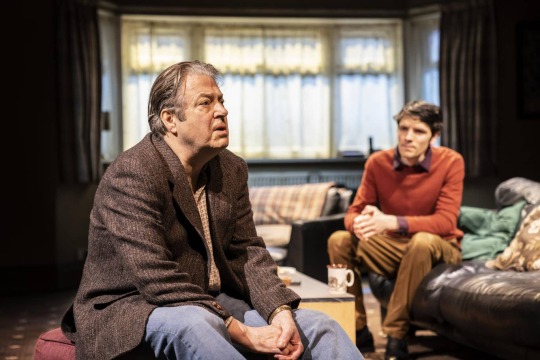
Can I talk about Michael now?
He’s so adorable. Can I just point out SPOILER that Michael is Irish! Even Irish clones are better! Unlike in All My Sons, Colin catches a break and can conclude this show on a happier note, he’s a happy man attune to and accepting of similarities to the likes of apes and lettuces. He’s a purple shirt of sex wearing Maths teacher twenty years away from Netflix and Chill with his pointy eared wife (possibly called Rebecca in my head) and he’s at ease with life, fatherhood and clone-being. I love Michael. When he’s on stage “you can’t help feeling wonderful”.
Dean (Gloria) has a cheerful contender for my heart. Who saw that coming?
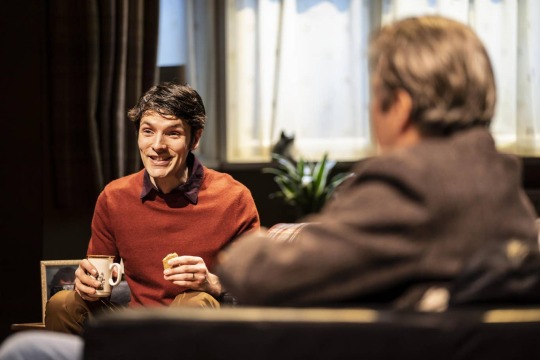
After that ridiculous wait we all had to endure while Colin was being all lazy and stuff we finally get some Colin vs Bad Dad on stage again!
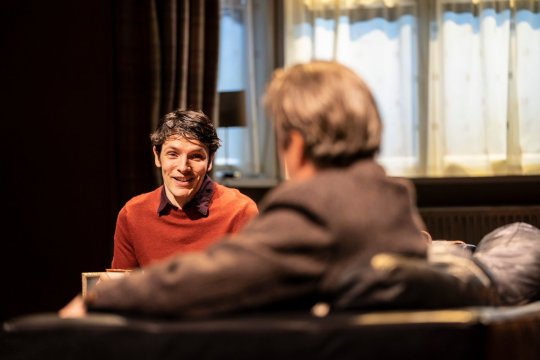
PS. Did I mention that Michael is lovely?
#ColinMorgan#Colin Morgan#Roger Allam#RogerAllam#A Number#ANumber#TheBridgeTheatre#The Bridge Theatre#RJC#Polly Findlay#Caryl Churchill
174 notes
·
View notes
Text
Save the Cat! Explained: The Middle
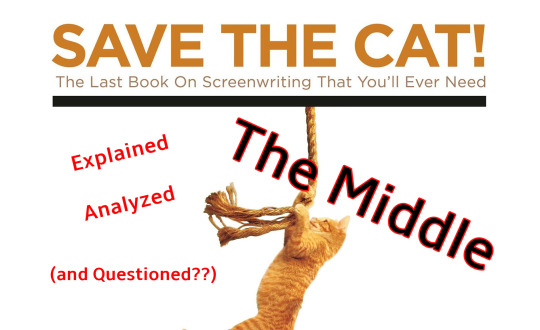
Now that we've addressed the beginning, we're diving into the middle of the Save the Cat! story structure.
Also, I want to mention that you can find loads of story examples of this structure here, should you want to look at others. I realize a lot of us might be tired of Spider-verse at this point--but I find it helpful to use the same story to compare and contrast different structures. If we keep using different stories (like what everyone else does), then we miss out on some insights and conclusions we can't draw otherwise. Plus, all this is going to lead to bigger points I'll be posting on my blog far down the road from now. (In any case, this is the last structure I'll be using this story example.)
I realize for some, using the same story may be more confusing, especially if you are new to structure. Please feel free to take what works for you and leave the rest. Structure itself can be confusing to anyone who is learning. Feel free to skip the examples or even my own thoughts and opinions, if that best suits you (heck, or even this whole series). It's all good.
And now . . .
The Middle
Break into Two (25)
Now that the beginning is completed, it's time to get to the middle--and in most structures, this is considered Act II, which is where the title of this term comes from. As Snyder puts it, "The act break is the moment where we leave the old world . . . behind and proceed into a world that is the upside down version of that . . . But because these two worlds are so distinct, the act of actually stepping into Act II must be definite."
In the Hero's Journey, this is called "Crossing the Threshold." While the Hero's Journey focuses more on how this is the protagonist transitioning to the "special world," Save the Cat! points out that this is a moment where the protagonist chooses to go forward into the "other world" or, as he calls it, the "antithesis world" himself or herself. It must be a choice. If the hero is tricked, dragged, or lured, it will probably fall flat.
Snyder also says that something big must happen here to lead to the protagonist making this decision. In my opinion, this is an event that can be big either internally or externally--it's significant. So in Star Wars, the event is Luke's aunt and uncle being killed, which leads him to decide to go on his journey.
Big Event --> Protagonist Decides to Move Forward.

In Spider-verse
After Miles finds the spider that bit him, he encounters Spider-man fighting Green Goblin and the collider. Peter asks for Miles's help, explaining that the collider could destroy all of Brooklyn, this and Peter's death are the big events that lead to Miles making the decision to move forward. He may not like the idea, but he won't be passive about it. He'll at least try to fix the goober and save Brooklyn.
B Story (30)
According to Snyder, this is where the B story of the narrative is introduced. In most movies, this will be a love story between the protagonist and the love interest. It's also a story that carries the theme. Snyder sees this as sort of a moment that smooths over the transition from Act I to Act II that we just saw, so it doesn't feel so obvious. The B story here gives the audience a break from the A story, that has had a lot of focus (and has gotten intense).
The B story often has a bunch of new characters. And in this approach, they are upside down versions of characters that were in Act I.
This doesn't have to be a romance plotline, but it's almost always a relationship plotline. It can be about best friends, siblings, parent and child, student and mentor, coworkers--the key is that it can't be wholly antagonistic. Even if the characters seem to be enemies or rivals on the surface, that barrier is broken down to some degree. In Moana, this is when Moana meets and begins trying to work with Maui.
Some say, this may not even need to be a human relationship. It might be about the protagonist and his car.
In Story, Robert McKee talks about how having a relationship plotline (of some sort) works well to balance out all the intensity of the A story (primary plotline)--they complement each other.
My Thoughts and Opinion:
And if you think about it, to me, it makes sense. The primary plotline typically weaves together the greatest external and greatest internal journeys of the hero. A relationship plot fits nicely in the middle of those two--it's more intimate than the external journey, but a degree distant from the internal journey, which gives the events of the story as a whole, more dimension.
In contrast, if you try to add another more external plotline, it might feel off, or if you try to add another inner plotline it might feel off--busy and competitive, since we already have plotlines for those.
A relationship also gives the hero someone to talk to about what's happening; he or she can bounce ideas off someone who is not closely involved, and possibly get another perspective of their problems.
While I appreciate Snyder including this term (as he's the only one who does it this way),
I personally disagree just a bit with the definition. I already mentioned how I think you could create a relationship plotline with (seeming) enemies, but I also don't think the characters in here need to be new characters. From some of the lines in the book, I can't quite tell if Snyder believes this or not. He seems to imply at first that the audience could have met them in Act I, but right after he says, "We did not even know they existed."
But loads of stories introduce B story characters in Act I and maybe even introduce the type of relationship the protagonist has or will have or has had with them. A lot of times, the protagonist runs into the love interest rather early.
So here's how I would explain this. The term B Story doesn't necessarily relate to introducing the B story characters or plotline, but rather is where that plotline begins to take a turn in development. Sure, it can be an introduction to a brand new person. Or, it can be a shift in a relationship already established, so that it starts a path to becoming something different. In this sense, even characters we've met in Act I, can turn out to be (somewhat) "upside down" versions of themselves--the hero will likely see a new side to the other person. The person may actually be totally different than what the hero thought, or maybe is cleverer, kinder, more capable, more understanding, than expected. It's simply (at least) a moment where the hero interacts with the other person in a way that hasn't happened before.
I also disagree somewhat with his thoughts about the theme. Yes, absolutely the B story should relate or touch on the theme in some way--I mean really, ideally, all "through" plotlines should. In particular, a relationship is a great place to have discussions about the theme topic. Maybe it's possible that the B story might address the topic more openly, but hands down the A story/primary plotline should be addressing the theme way more. I mean, it's the primary plot!
The difference is this: The A story shows the theme more and takes the whole story to do it. The B story allows more room for the writer to tell the theme, through the relationship plot line, and if not tell, show it in more obvious ways. Since all plotlines should relate to the theme, really, the B story may be a more simplistic, mirrored, exaggerated, inverted, or contrasting example of the theme. It gives more thematic power, understanding, refining, or complexity to the A story. It also sometimes (not always) reaches a thematic conclusion, earlier (which fuels the A story).
I'm not convinced the B story needs to always be a relationship. Instead, I think the B story is a plotline that (as I said above) fits between the protagonist's external and internal plotlines. Not as big and far-reaching as the protagonist's external journey, but not as intimate and personal as the protagonist's internal journey. For example, the A story could be about the protagonist fighting in a war and how that changes him. The B story could be about two business owners in conflict about how they contribute to the war efforts--not as big as the war story, but not as personal as the character arc. That, in my opinion, is a B story.
And often in many stories, a relationship will fit those requirements just fine. And often, in most stories, there will be an important relationship. But it feels narrow to say the B story is always a relationship.
Also, the B story is a plotline that feeds into the A story in some way, maybe literally or maybe only thematically. But the B feeds into the A, not the other way around--something that can be helpful to writers so they can discern what fits where.

In Spider-verse
Soon after trying to become Spider-man, Miles meets a Peter Parker from another dimension. He's almost quite literally an upside down version of the Peter Parker that died--different hair color, older, out of shape, at a low point in his life. Notice how he offers a more simplistic yet exaggerated version of the theme. He claims he loves to be Spider-man and always gets back up, no matter how many times he gets knocked down, but the footage actually shows the exact opposite of what he is saying. Miles and Peter have a student-mentor relationship plotline, which will allow them to address the theme a little more openly. It also fits between the Miles's external journey and internal journey, adding dimension.
Fun & Games (30 - 55)
This section is the promise of the premise.
It delivers on what the audience "came for." It answers their question, "Why did I choose this story to immerse myself into?"
So in Legally Blonde, this is where we see Elle trying (and failing) to fit into law school. In Elf, this is where we see Buddy trying to navigate New York. In The Emperor's New Groove, this is when we get to see Kuzco stuck as a llama. In an origin superhero movie, this is usually where we get to see the hero using his superpowers. If this is a buddy story, this is usually where we see the buddies clashing with each other in the most entertaining ways.
Snyder says this part of the structure is more concerned with having fun than with moving the story forward.
Think of movie trailers--this is the section where they get a lot of the clips from.
While I think the Hero's Journey would consider these moments "tests" of the Special World, I like the playfulness Snyder's perspective brings to this section, though "playful" might fit some stories better than others. For example, I wouldn't really consider the moments of this section in the Hunger Games, to be "fun," so I'd rather call them "tests."

In Spider-verse
After meeting the alternate Peter Parker, we get a lot of entertainment with the interactions between him and Miles--which contrasts experience with inexperience. They clash. But it's more than that, this is where we start getting to see Miles really learning what it's like to be Spider-man, as he has to encounter villains as Spider-man for the first time.
Midpoint (55)
I've talked about midpoints in other posts. In fact, I once did a whole post about midpoints. Save the Cat! has a different interpretation of what a midpoint is, in comparison to other structures.
What I hear from other structures is that the midpoint is the moment the hero moves from responding and wandering around, to being active and in a "warrior" mode. In order for that to happen, there must be new, significant information that enters the story, which gives the character a greater understanding of what's going on.
But Save the Cat! defines it differently. The midpoint still happens in the middle, but it's either a "false win" or a "false lose." The stakes are also raised (which actually fits into the other definition, because when new information enters the story, it raises the stakes so the character becomes more active).
Snyder zeros in on the idea of the "false win" or "false lose." Around this point, he says, the hero seems to get everything she wanted, but in reality, she hasn't yet learned what she needs to. It seems like a victory, but it's not. It's a "false victory." This is meant to contrast the "All is Lost" beat that comes at the end of the middle, which is described as a "false defeat."
"It's never as good as it seems to be at the midpoint," Snyder says, "and it's never as bad as it seems to be at the 'All is Lost' point."
This can be switched around, he says. So if you have a false defeat at the midpoint, you'll have a false victory at what would be the "All is Lost" point. This means the midpoint will seem like a loss to the protagonist.
My Thoughts and Opinion:
Using this structure, I sometimes feel like the word "false" can be a bit misleading. In some stories, this is exactly what happens. But other times, I'd maybe call it an "incomplete victory" or "incomplete defeat," or maybe even a "seeming victory/defeat." Because the heroes may succeed at something, but still be aware they have more work to do, or vice versa. They may not necessarily be completely misled. And it may actually be a sort of short-term victory/defeat. I mean, I get what Snyder's saying, but I think the word choice can make it confusing to some writers who are learning. But as always, understanding the concept is more important.
And while I think this approach works, I'm not completely sold on this idea yet, mainly because most stories will put an All is Lost beat and a Reward/Victory beat right next to each other regardless of whether the midpoint is a victory or defeat. I almost feel like it just depends on how you slice and dice structure rather than what the midpoint is. Near the end of the middle and the beginning of the end, there is almost always a sort of negative (-) beat (All is Lost), followed by a positive(+) beat (Reward), followed by another negative(-) beat (related to the the bad guys)--so doesn't it just sort of depend on where you draw the line? (I'm sure I've gotten too complicated for half my readers . . . moving on. 😆)
Anyway, maybe I just wish Snyder gave a clearer idea of what the alternate version looks like, beyond simply saying a false defeat midpoint goes to a false victory later and giving only one quick example.
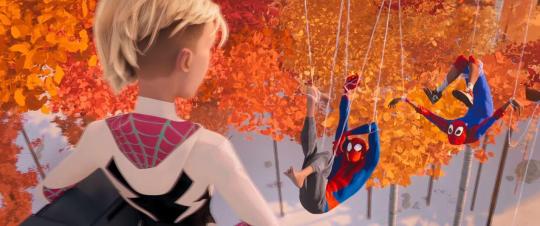
In Spider-verse
Peter B. Parker and Miles (and Gwen) succeed in getting the computer from Alchemax. We also learn that if Peter and Gwen don't return to their proper dimensions, not only will they be glitchy, but they'll die. Doc Ock is given a tighter timeline to get the collider finished. Both of these things raise the stakes. And getting the computer seems like a victory.
Bad Guys Close In (55 - 75)
If the midpoint is a false victory, then all seems fine . . . until the bad guys close in.
"This is the point where the bad guys decide to regroup and send heavy artillery. It's the point where internal dissent, doubt, and jealousy begin to disintegrate the hero's team."
The antagonistic forces tighten their grip on the hero. So basically they are re-engaging with the hero. While Snyder doesn't say this, I think he'd agree that here they have become more cunning and conniving or maybe just more ruthless.
My Thoughts:
One thing I wish is that Snyder would address how this section may be different (or the same) if the midpoint is a false defeat (from his approach/perspective). Does this flip too? So that it's the hero that closes in on the bad guys? Then I wonder how much it matters--cause really, through here, in a lot of stories both sides are preparing and engaging in conflict. So I still think it largely depends on how you slice and dice it.
In comparison to other structures, I would say in the Hero's Journey, this would encompass "Approach the Inmost Cave" and begins to go into "The Ordeal." In the 7 Point Story Structure, this would include Pinch Point 2.

In Spider-verse
Peter, Miles, and Gwen, go to Aunt May's house, where they meet more allies and prepare to defeat Kingpin. Soon after this, Miles discovers that his uncle is actually Prowler. The bad guys close in as he leads them back to Aunt May's, and a fight breaks out.
All is Lost (75)
This is a moment in the story that feels like a total defeat. (It's the "false defeat.") All hope seems lost. All goals seem lost. Everything is doomed. At least that's what it looks like.
Save the Cat! adds a new technique to this moment called "The whiff of death."
It's pretty straightforward. Here either someone dies or at least, the idea of dying is touched on in some way. In a lot of stories, this may be where the mentor dies. But even in stories where there is no death, there should be the presence of death. It might be a dead flower or goldfish or news of a relative dying from somewhere far away.
This taps into the mythic structure of the Hero's Journey--where the old version of the protagonist dies to make room for a new version of the protagonist. Snyder shares this same idea. It's the old world within the character that dies. "All good, primal stories must have this. It resonates for a reason."
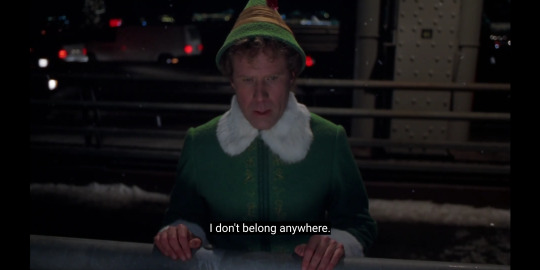
In Spider-verse
At the end of the fight, Uncle Aaron dies. The other spider people tell Miles he's not ready to be a superhero.
Dark Night of the Soul (75 - 85)
Now that everything seems lost, we need to take some time to show how the character feels about this. Save the Cat! says this is vital to the story. "It can last five seconds or five minutes." The hero needs to feel the defeat to the extent that she seems unable to continue. It's the darkness before the dawn. In order to learn her life lesson, she must be humble and beaten.
In The Hunger Games, this is Katniss feeling terrible after Rue dies--it seems that nothing pure and innocent can survive this world, and she can't protect the pure and innocent despite her best efforts.
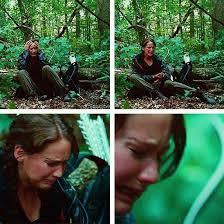
In Spider-verse
Tied up, Miles is at his lowest low. He's alone and even more alienated from his dad. He seems to have failed in every way.
. . . and next will be my last post on this structure, the end according to Save the Cat!
52 notes
·
View notes
Text
missing linc // chapter eight
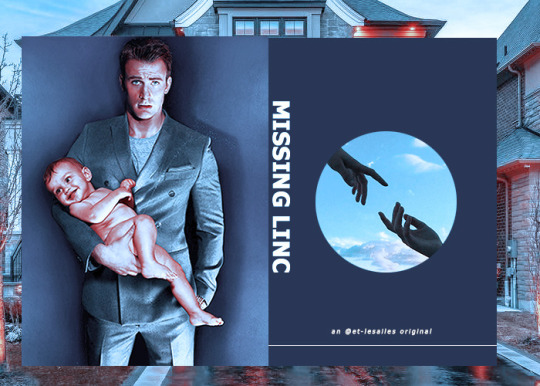
series masterlist
pairing: ceo!dad!steve x reader
word count: 2620
chapter summary: a little backstory on tiana’s relationship with steve, and stella’s.
WARNINGS: implications of rape and violence, please do not read if this makes you uncomfortable.
taglist: @viarogers , @evanstush , @chibi-crazy , @cevanswh0re , @songforhema, @sebabestianstan101 , @bval-1, @wonderwinchester, @poerebel , @gogomez-509 , @patzammit, @a-distantdreamer, @jbug491writinghelp, @broklynbby, @lille-kattunge, @rohaintahquil, @deidrashouseofpain, @firstangeldragonranch, @peach-acid, @allsortsofinterests, @xoxabs88xox, @honeyloverogers, @capsiclesdoll, @mcueveryday, @bangtan-serendipity, @heyyouwiththeassbutt, @cptn-sgrogers, @heyiamthatbitch, @captainscanadian, @kaithezaftig, @morganhoran1671, @booktease21, @hista-girl, @steeeeverogers, @okilover02, @sadella-adams, @rumoured-whispers, @aletteredaffair, @shannon124, @isawritesstories, @knuffeltuff, @wxntersoldiers, @kelbabyblue, @macgruberrr, @troublermalik, @societalfailure, @brastrangled, @hidden-behind-the-fourth-wall, @anxiousstark, @captainsbxbygirl, @barbar126, @cevanswhores, @whimsicalatbest, @amazonian-strap-queen, @bookish-shristi, @hannie-stark, @beardburnsupersoldiers, @babyhua, @kind-sober-fullydressed, @whores4thor, @gingerninjaprincess16, @straightforwardly, @danathewitchywoman, @rosee-sensuelle, @angelicdisgrace, @thoughtfulcollectormaker, @sammyslonglostshoe, @mizariomi, @jadedhillon, @bohemian-barbie, @marvelouspottering, @denisemarieangelina, @mango--mango, @frencchfries, @xlanawriter, @littlemoistcarrot, @pottxrwolff, @arianatheangelworld, @ifuseekamyevans, @lovehatekickscream, @southerngracela, @nsfwsebbie
notes: okay FINALLY back home from traveling and FINALLY updating. i know you guys miss steve/reader interactions, but seeing this is more of an actual story with several relations involved, there’s a lot to unpack here so i apologize. maybe i’ll make it up to ya in the next chapter ;) as usual please give me feedback, i’m interested to see how you feel about all the characters after this! this is also a taglist check-- if you are on this taglist and do not at LEAST give this post a like within the week, i will be removing you!

TIANA
They met in graduate school. Both in their early twenties, figuring out life, trying to balance the demanding expectations of their classes and the fun times with their friends.
They had been in the “honeymoon phase” since before they even started dating. Tiana remembered every single detail about the night they first met. A mutual friend’s party, she was wearing a brand new top she had just bought that day itself on a spontaneous shopping trip with her best friends paired with jeans that made her legs look amazing, as Steve would tell her later that night. It was practically a cliche movie moment; they locked eyes across the room and couldn’t stop staring. Steve approached her, his blue eyes bright, blond hair neatly trimmed, jawline chiseled, the sleeves of his nice shirt hugging his built biceps. If she wasn’t in love already, their conversation was even more appealing. They found a corner to themselves and talked about everything under the sun. The little things, such as the weird insect Steve found under a rock while he was camping when he was six and the best piece of pizza Tiana had ever eaten in her life in New York City just last week. The big things, too. Steve reflecting on his mother’s death when he was young, and Tiana discussing her experiences with bulimia when she was a mere middle schooler.
She had never felt so comfortable with someone in her life. It didn’t take long for them to start dating. They had received plenty of criticism from all their friend groups. “You’re jumping into this too fast.” “It won’t last if you rush things.” “Don’t you want to get to know each other better first before putting a label on this?”
She knew every part of him. And he, her. He was truly her other half. And she, his.
He was a big romantic. On her twenty-fifth birthday, he surprised her by using money he had saved up to rent out the small diner her parents would take her and her sister out to dinner every Sunday night-- for a small and intimate party for her and their friends. One particular Christmas when she expressed being a little sad they did not yet have a proper home to decorate in pretty lights, he strung up lights around the inside of the entire apartment while she was at work, even putting up an inflatable snowman in their bedroom. She could still remember coming home that day, tired and weary, only to be met with absolute joy and brightness. The snowman looked so adorably ridiculous inside their tiny bedroom, she had burst out laughing and couldn’t stop for the next five minutes.
She could remember all of this vividly. It was when things all went wrong that it was a bit of a blur.
Steve studied hard. He worked hard. He found the time for her, it was never time management that had been a problem. He worked his way up in his company until he decided he wanted to start his own. It was a huge investment, but he had been saving. He refused to accept financial help from her-- not that she was in any better position. She had a great job as a data security analyst, but she was nowhere near as senior as Steve already was. She was getting there, but he was older, and he had put in more time to his business degree and certifications. This was something he had wanted since he was young.
And so he followed his dreams. He started a company, and it was incredibly small at first. Still, she was proud of him. More proud than she had ever been of anyone in her life. Watching him have so much ambition and drive only motivated her to do better. And so she did; she worked hard, making her way up her own company, doing whatever she could to be a girlfriend Steve could continue being proud of.
Perhaps it was this pressure that made their relationship implode.
He had never given this pressure to her. She could acknowledge this. He never acted in a way that made her feel inferior, in a way where he thought he was better for being a big CEO. She supposed she was the one who put the pressure on herself, who continued to feel more and more insecure as she watched her boyfriend, eventually fiance, eventually husband’s company grow and grow, his responsibilities becoming bigger and bigger. They had less time together, but when they did have time, he made up for it. He was always good about that. He always made it a point to communicate with her, to tell her in advance when he was busy, and to always ask and be genuinely curious about her day and how she was doing.
He was the perfect partner. And she felt like she was not.
She started to lash out more. Perhaps subconsciously pushing him away so that she did not have to face her insecurities so directly while standing next to him. She became more irritable, she spent more time with her own friends and prioritized them over him. He was confused, sad, upset-- it was all an ugly, convoluted mess. She hated herself more and more each time she broke his heart, but she continued to do it. His sadness began to turn into anger. “What did I do to you, Tiana? What did I do that was so wrong?” he would yell, his eyes even wet with tears from his frustration. “Why are you acting like this?” She didn’t know why she couldn’t tell him. She used to be able to tell him anything, and now she felt so small and insignificant next to him. She felt like she wasn’t doing enough. The more oblivious he was to this matter, the less he could help her or reassure her that this was not the case. It was not his fault. It was hers.
She knew that.
They decided to spend some time apart. Not an official break up, but a break, as much as she hated that term. They needed it. She needed to be alone, to work through her insecurities and crippling low self-esteem. He simply needed to be away from the confusing trainwreck that she was. They did not completely cut off communication; they checked in with each other at least once or twice a week, and that eventually turned into occasionally grabbing coffee or lunch together. It was like the process of dating all over again, and it was actually refreshing. She did not feel the pressure that came with living in the same home with him, watching all of his work endeavors and feeling shitty with her own. They could take it nice and slow, and she was enjoying it.
She thought he was, too.
Four months into their odd, friendship-slash-dating relationship, Steve called her one night, close to midnight. He sounded somber. Tired. Guilty. Ashamed. Scared, even. “We need to talk. In person. Can I come over?” She remembered her heart racing fast. The worst scenarios popped into her mind, one-by-one. Had he decided he no longer wanted anything to do with her? Had she messed up somehow, and didn’t even know it? Was he okay-- had he been diagnosed with some type of life-threatening disease, had he been in an accident? Was his family okay-- was there a death, did he need to travel home? Every single possible situation played out in her mind, anxiety racking her brain.
Never had she imagined that Steve would come to her home to tell her that he had gotten another woman pregnant.
Never had she imagined that this woman was her own, twenty-two-year-old sister.
STELLA
Stella had always felt like the black sheep of the family.
She was the late addition suffering from the terrible cliche of having a perfect, older sister while she herself was the mischievous troublemaker, always up to no good. There was a thirteen year age difference between herself and Tiana, and because of this, it was difficult for the two to ever get close. The more she watched Tiana excel in academics, extracurriculars, and relationships, the less motivated she became. She figured being the less successful sibling without actually trying to do better was easier-- if she did actually try and fail, how would she ever feel any better about herself?
She barely managed to make it through high school, and the only reason she did was because her parents forced her to. She certainly was not going to college. She picked up different jobs and eventually moved out of her family’s house, tired of her parents’ lectures and nagging. The shitty little apartment she resided in with two random roommates in the most dangerous part of the city felt far more like home than her birth home ever did.
She had her looks going for her. She was the complete opposite of her sister, who while also pretty, took more after their father. Stella was her mother’s daughter; the classic supermodel body, blonde locks with natural waves, amber eyes, heart shaped face. She used this to her advantage. Her income consisted not only of her job as a bartender, but of being a sugar baby to random older men in the city. She refused to have sex with them. They were alright with this. They just wanted her company.
People could get desperate when they were lonely enough. Her string of one-night-stands proved she knew this.
She began modeling for an amateur photographer. Shoots in cute sweaters, leggings, and boots in the New York autumns turned into risque poses in strappy bikinis and high heels in the summer. It wasn’t long before the top came off, soft hands and long fingers shielding her breasts as she looked blankly into the camera.
The photographer wanted her to reveal even more. She declined.
He did not take that so well, despite being her own boyfriend.
She was twenty-two, bruised and black eyed as she stumbled out of his ratty apartment, legs sore and aching with tears running down her cheeks-- only to make her sob even more from the pain that came with the mere action of crying. She had gotten herself into a lot of sticky situations in the concrete jungle, but she was finally starting to feel fear.
She wasn’t sure why Steve Rogers was the first person who came to mind. Steve, her older sister’s golden boy, whom she had only met a few times at family dinners she actually bothered to show up to only when she needed free food. Perhaps because he was actually nice to her. Sure, maybe he was only being polite because he needed to impress his girlfriend’s parents. But sometimes, it seemed like he actually cared when he asked her how bartending was going and if she was safe and secure staying in the city. He did not seem judgmental in the slightest that she had passed on attending college, despite being a total scholar and businessman himself. He had even told her she was welcome to his and Tiana’s apartment any time, if she ever needed a place to crash; she remembered the dirty look Tiana had given him the second he had made this offer.
When was the last time she had even seen him? It had been a while.
She slowly took out her phone and pulled up his number. She only had it because Tiana had texted her from it one time when her phone was dead, telling her she better be at Thanksgiving dinner in order to not disappoint their grandparents who knew absolutely nothing about her mess of a situation.
When he told her that he and Tiana were separated, she was shocked. She would have never seen it coming. She remembered the way they’d look at each other, how they’d laugh over the dumbest things, how she had never seen her sister look so happy in the entire time she knew her.
He still wanted to help her, though. How could he not? She had been a sobbing mess on the phone as she recounted everything she had just gone through, all while wondering why she was suddenly being so trusting with a man she hardly knew. Perhaps because he was the only man in her life that actually seemed dependable.
She arrived to his apartment and he was shocked upon seeing her face. He wanted to call her parents, but she practically screamed at him not to. Begged. She couldn’t handle that, she could barely even handle being so vulnerable with him. He was reluctant but obliged, though insisted she stay with him in case her now ex-boyfriend tried to hunt her down and hurt her even more. She agreed, but was instantly on edge again once he told her he wanted to tell Tiana. “No. No, Steve, please, you can’t. She’ll drag me to my parents’ house, she’ll lecture me, she’s just-- she’s going to be a total bitch. I’ll stay here only for a few days tops then figure something out on my own. Please.”
Again, he reluctantly obliged.
She did not only stay for a few days. She found herself opening up to him more and more, she actually enjoyed spending time with him.
Strangely enough, she never developed feelings for him, nor he for her. It was a strong friendship, a strong bond, a good connection-- but all purely platonic. Perhaps it was her subconscious, reminding her that this man was involved with her sister. She knew they were still seeing each other from time to time, though it was nothing committal or exclusive. He had explained to her what had gone wrong between them, and she listened. Even offered him advice, based on the limited knowledge she had about her own sister’s personality and interests.
He kept pleading for her to let him tell Tiana that she was staying there, and she kept begging him not to. He was beginning to feel more guilty. Stella might as well have been living with him at that point.
“I’ll move back to my parents’.” She finally said one day, and he looked at her in surprise. “What? You hated living there. Besides, once you move back they’d never let you leave that place again. Especially if they find out everything that’s happened to you.”
“I’ll figure it out. You shouldn’t have to keep lying to my sister.”
And so it was decided. She would return home the next day, and Steve could live with at least a little less of a guilty conscience.
Or so they had thought. Their last night together turned from a simple pizza and movie night with beer to going out and hitting the bars, celebrating her last night in the heart of the city before she would have to return to her parents’ home outside of it. After several drinks and a fun night of dancing, the two came back to Steve’s apartment.
The rest was history.
They did not speak to each other even once after that night-- at least, not until the day she found out she was pregnant with Steve Rogers’ child. From there, she, Steve, and Tiana would be tangled up in one messy situation for the next nine months, until she could finally have the little blond, blue-eyed child and be free from her family thanks to Steve’s money supporting her in the city while he and Tiana moved and took the baby with them.
She had never wanted it, anyways. There was no way someone like her could be a mother.
312 notes
·
View notes
Text
Ladyhawke: Facets of Filmmaking
Thankfully, unlike The Wizard of Oz, Ladyhawke’s production turned out to be much less of a…..production.
With only one director on the scene, a handful of talented actors and some great locations, Ladyhawke’s behind-the-scenes story is far less dramatic than other fantasy films before it, no doubt much to everyone’s relief. That doesn’t mean there isn’t anything interesting to look at, though.
Today’s article isn’t answering a question, or discussing any of the themes of the film itself, instead, we’re going to be taking a look behind-the-scenes to learn a few facts about the film, and discover how we got the final product.
Originally pitched in 1981, Lauren Shuler, the producer of the film, fought to make Ladyhawke a possibility for four years. Thanks to the difficult casting, set building, location work and battles with the studio, the project ended up taking far more time than it should have, but in the end, it did get made, and turned out a decent product. What we’re looking at today is how that happened.
For starters, before you start making a movie, you had to find somewhere to make it. Let’s talk about location-hunting.
By the time he did Ladyhawke, director Richard Donner had already been involved in other, well-done films, including the first two Superman films, and had been directing since 1960. In other words, this movie business was old hat. The man knew how to find a location, and started his search for the fantasy setting overseas, in Czechoslovakia. Donner, knowing that he wanted an ‘authentic’ medieval look and feel for his film, found several locations that he felt would be perfect, but there was one small problem:
In the mid-80s, Czechoslovakia was under the control of the Soviet Union.
So he turned elsewhere, this time settling on another location that would have been far less difficult to work with: Italy.
After a short time checking out other countries, including Spain, production settled in the Italian countryside for filming. Donner approved of the landscaping so much, he personally joined the scouting team, driving around for two full months, finding every location used in the movie in only a handful of weeks. Even with the few bumps in the road ahead (such as not being permitted to film inside the real medieval churches, having to spend two months constructing sets instead), Donner had found the perfect spots for his fairy-tale.

In fact, Richard Donner was so enthusiastic about the locations, he even tried to find a way to put it in the soundtrack. From the beginning of the setting search, he had one person in mind for the soundtrack: The Alan Parsons project people, Andrew Powell and Alan Parsons. The composers claimed to draw inspiration from, among other things, the landscape itself, attempting to put what they saw into the soundtrack. Whether they succeeded is very much a matter of opinion.
Once they had somewhere to film, however, what came next was casting.
Originally, the cast for Ladyhawke looked considerably different than what we got. Rutger Hauer was an original choice, but instead of being cast as Navarre, Hauer was originally wanted as a villainous character. (This would have fit in with his traditional bad-guy roles.) Wanting to avoid typecasting, Hauer told Donner that he liked the script, but didn’t want to play the villain, telling him to call back if he needed someone for Navarre.
Currently filling the role of Navarre was none other than Kurt Russell. Russell dropped out just before filming was to begin, leaving the film without a hero. Hauer was given the part of Navarre instead, probably a better choice for the understated, serious knight, and filming began with Hauer in one of his only main roles. On top of pure acting ability, Hauer had also been swordfighting and horseback riding since his teens, and was skilled enough to credibly pull off the physical aspects of the part. Once cast, Hauer drove his eighteen-wheel mobile home from his home in the Netherlands to the location in Italy, creating quite a stir.
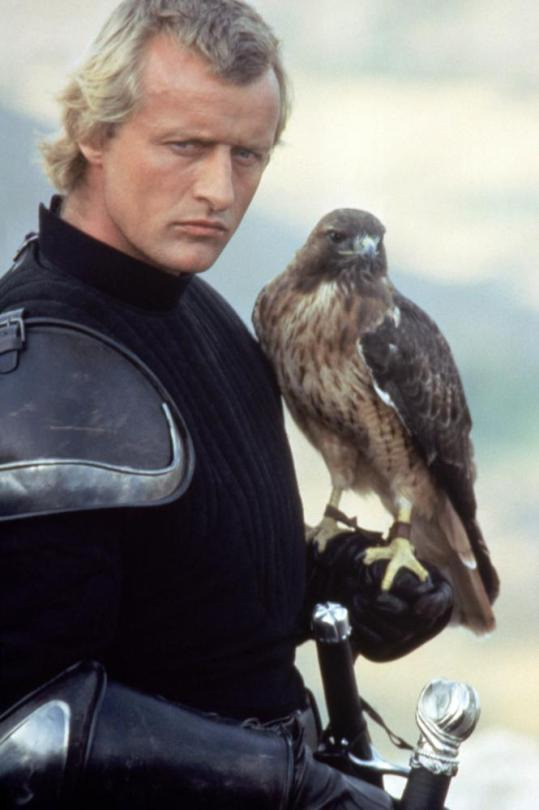
There were other parts to cast, however. Some of the original choices for the original parts were actually quite surprising; Mick Jagger was considered for the Bishop of Aquila and Sean Connery was originally a possible choice for the villainous captain of the guard, Marquet. In the end, the roles went to John Wood and Ken Hutchinson, respectively.
But that still left the protagonist uncast.
Matthew Broderick, recently coming off of hit film Wargames (In which he also starred with John Wood), was not the first choice for the main role of Phillipe Gaston. Instead, Dustin Hoffman was in the consideration, being a huge star-power factor. On the other hand, Hoffman had been in the film business for over twenty years already, and was older than Rutger Hauer. Richard Donner decided that he wanted Gaston to be a younger character, and their attention turned to Sean Penn, who was considerably newer to the movies. In the end, Penn turned the role down, and the part went to Broderick, who was twenty two at the time of the film’s release.
That still leaves the titular Ladyhawke.
Michelle Pfieffer originally approached the role of Isabeau with caution, stating that she didn’t want to play a ‘beautiful princess romping through the woods’ character. After she read the script, she decided that she liked it, and sent in an audition tape where she read lines with a friend of hers, the then-unknown Kevin Costner.

Also on her audition tape was a decidedly humorous twist: Pfieffer, without an actual hawk, turned her camera on a little bird, providing a voice-over from off-screen. Donner, liking both her performance and sense of humor, cast her as Isabeau.
With casting finished, all that was left to do was actually film this thing.
Ladyhawke was physically hard on the actors, notably Hauer and Broderick. While filming the climactic church fight scene, Rutger Hauer lost twenty pounds, thanks to the heavy costume and sword action.
Matthew Broderick, however, possibly got the shorter end of the physical discomfort deal.
During the beginning escape scene from the prison, the script requires Broderick’s character to swim through the sewers to shore, emerging from the water and running away into the countryside. Unfortunately, this took two hours to complete, during which Broderick had to ‘burst’ from the water repeatedly, spending a lot of time deep in frigid water. Once this scene had finished, he had to then film scenes running through wintry landscapes, still dripping wet. Needless to say, he spent quite a bit of time wet and cold, but it wasn’t all bad. Richard Donner, a caring director, had the production team put together a wet suit and some insulation for Broderick to wear underneath his costume during shots that didn’t require close-ups.
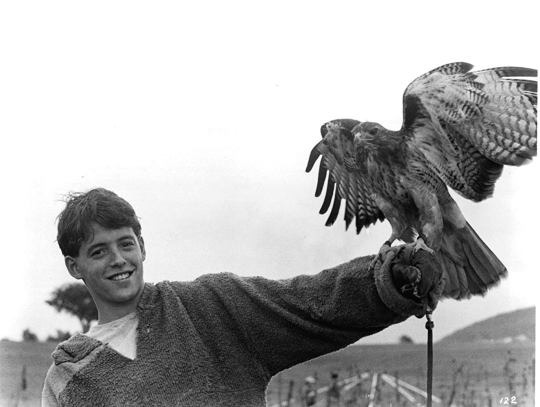
The problems didn’t exactly end there. Matthew Broderick, a young American actor, struggled with a European accent that is noticeably odd in the final project, and also had no experience with horses. This unfortunately led to an incident during which the horse Broderick was seated upon took off at high speed, prompted by a smack from Hauer. Members of the production crew set off in jeeps, and discovered Broderick and the horse half a mile away.
Despite casting difficulties, location setbacks and other problems, Ladyhawke was released on April 12th of 1985 with a budget of 20 million dollars and a box office of $18.43 million. In the end, the film was mostly forgotten, finding second life later on VHS and DVD. An unknown classic fairy-tale story, it is fondly regarded by the devoted gathering it’s accumulated in the years since its release. Overall, it remains a unique cult classic, likely to remain beloved by dedicated fans for years to come.
We’re almost finished with our study on Ladyhawke! Join us next week for our final thoughts, and don’t forget the ask box is always open. Thanks so much for reading, and I hope to see you in the next article!
#Ladyhawke#Ladyhawke 1985#1985#80s#Film#Movies#Fantasy#Adventure#PG-13#Rutger Hauer#Michelle Pfeiffer#Matthew Broderick#John Wood#Leo McKern#Richard Donner
14 notes
·
View notes
Text
LGBTQ and BIPOC in Media Blog #3
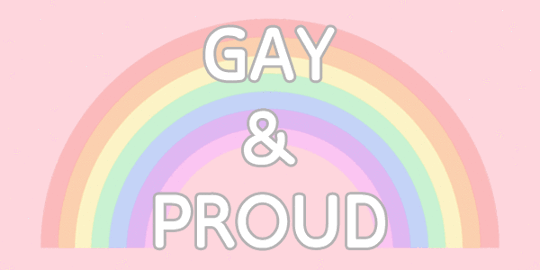

In this unit, we watched five films that involve LGBTQ and BIOPIC themes. I believe that these films can be considered “Queer” style films. In my opinion, a film can be considered “queer” when it shows the challenges and hardships of the LGBTQ community. The representation of characters in the community through a stylistic or aesthetic approach. Each of these films shows different LGBTQ stories that present differently. Queer films involve unique editing and other visual details to show the characters. These different elements help show the audience the message and represent the LGBTQ community. I believe that in “queer” style films there is a lot of emphasis on nature and natural beauty. In “Brokeback Mountain” the setting for the majority of the film is in the beautiful mountains surrounded by wildlife and greens. “Call Me By Your Name” takes place in the beautiful countryside of Italy with natural lakes and lots of trees with colorful flowers and fruits. The environment in “Moonlight” shows how rough life can be but also how beauty can be revealed. “Mysterious Skin” and “Boy’s Don’t Cry” show the beauty in a small town with secrets. Truthfully, I have never seen any of these films and probably would never pick out these films to watch, but I enjoyed all of them in different ways.

Queer-style stories show challenges and breakthroughs of who you really are. The film “Moonlight” is an excellent movie and I think that it represents the Black, Indigenous, and People of Color (BIPOC) very well. This movie had a full cast of POC. This movie shows the struggle that Chiron, a quiet black kid who had a very troubling life. Throughout Chiron’s life, he had been bullied and neglected by his parents. Chiron ran away from his bullies right into Juan’s life. ( 3:50-5:40). Juan is a local honest man who also happens to be a drug dealer. This film showed the emotional trauma that many black men go through. Black men are expected to be tough and not very sensitive. Because Chiron was smaller than the other kids and quiet he made for a target for other kids in his town. I believe that Chiron’s race had a big impact on his coming out and how he found his identity. “Moonlight” included many images that are cinematography beautiful and have a queer style to them. Including when Kevin and Chiron find each other together at the beach at night (49:15-56:20). In this scene under the moonlight on the beach, Chiron and Kevin share an intimate experience and were able to show each other their identities. The editing during this scene gives the watcher a mix of nature and touch. Many people who are LGBTQ have trouble finding their identity growing up. I feel that his story is like many others especially for people of color. I feel that these people are less accepted by the public and family.


“Boy’s Don’t Cry” and “Moonlight” share the struggles of finding your masculinity and self-expression. Although Brandon did not have to worry about race expression he did have to worry about gender expression like Chiron. Brandon Teena identified as a male but did not want to tell his new group of friends who treated him as one of their own. Brandon tries to conform to the social norms of how men are supposed to act and look. Specifically, Brandon changed how his body looked in order for it to look more masculine. He taped up his breasts and adds socks to his underwear (31:45-32:21). Unfortunately, things are not allowed as we plan them. Brandon and Lana fall of each other and begin a romantic relationship. When Tom and John find out that Brandon is not biologically male they turn to extreme violence and torture. They exposed his female part to Lana and everyone as a form of torture then they brought him to an abandoned parking lot where they beat and raped him. This action was to disintegrate Brandon’s gender as a male and his identity (1:22:10-1:30:18). The way the visual elements were displayed the watcher really feels for Brandon and allows the watcher to think twice about how we treat people in the LGBTQ community.
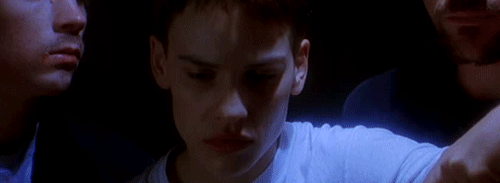
“Brokeback Mountain” shared a powerful movie about lovers who did not take their chance for one another. This film showed the way nature will show someone’s true nature. Ennis and Jack worked together for the summer and formed an unexpected relationship. Neither man identified as LGBTQ when they both say that they are not “queer” but formed a love for the other man. They had a bond that they could not explain and that they have never felt before. Even four-plus years later they shared the same feel like the beginning of their relationship. In the end, Jack had died and when Ennis finds out he is completely heartbroken. They had talked about living together and starting a farm but never did because of the time and how the LGBTQ people were treated. Ennis recalls a story to Jack about his dad showing him what happened to a gay man who was beaten and mutilated (1:11:22-1:12:25). Ennis was shown by his father the consequences of being gay and what would happen if he were to be gay. Later when Jack had died his wife says that there was an accident when Jack was changing a tire. Although we see that Jack was a victim of a hate crime just like the man Ennis’s father showed him. Beaten and mutilated to death (1:53:02-1:55:13). I believe that the treatment that Jack went through is similar to Brandon in “Boy’s Don’t Cry.” Both men were killed by people who discriminated against people of the LGBTQ community and the people in it. They were killed as a hate crime to show a message. This way of presenting films shows the gruesome truth of how some LGBTQ are treated.
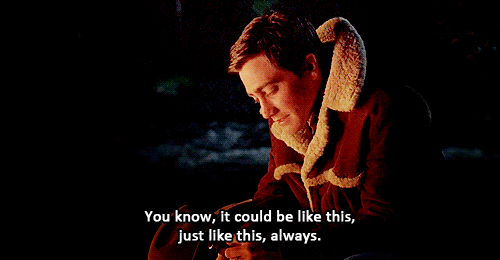
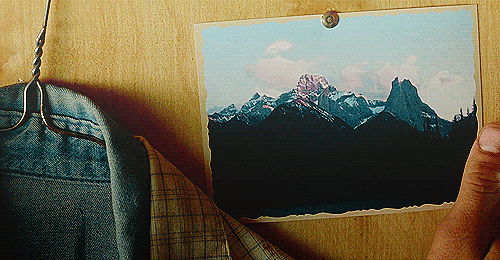
“Call Me By Your Name” shows a beautiful relationship between two men that blossoms over the summer in Italy. Elio and Oliver both have trouble speaking up about their feelings. Elio is a young teenager and has not experienced love like how he feels for Oliver. Oliver is not sure that Elio likes him at all. Once they both knew about their feelings for one another they only had a number of days left (2:06:33-2:07:00). They had a very special relationship where they were they were closer than regular friends, more intimate than loves, and have a bond that will change their lives forever. These men were also not characterized as gay in the film. This movie is what I would think about when talking about a “queer” style. The way the characters are represented and the scenery made them seem “perfect”. This movie shows the perfect scenario even though they do not end up together. Their lives were pretty perfect and unattainable. I enjoyed the movie because of the story but in terms of realism, it does not feel like it. In the film, they shared a lot of passion. On their first night together the camera shows the bed they share and then moves outside onto the trees swaying in the summer night. All their passion is surrounded by nature.
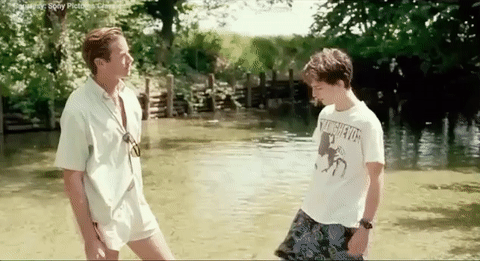

“Mysterious Skin” shows how sexual abuse at a young age can change a person drastically. The coach of a little league took advantage of at least two of his young players, Brian and Neil. Because the boys were so young and not able to really understand the extent of what had happened to them. Neil was abused for a whole summer and believed that his coach actually loved him and thought he was special. He says ”No one ever made me feel that way before or since. I was special.”... “Yeah, but he really loved me. I mean, there were other kids sometimes, but I was his prize.”(1:11:24-1:11:49) He believed that Coach loved him and what he felt during the abuse was the peak of love. I think his willingness to subject himself to abuse in his adult years shows how the abuse followed him. His coach was a father figure in his life and because of this, he grew the compulsion of pleasing older men. He had been “groomed” by his abuser. While Brian was abused by his coach twice but he “blacked out” both times and configures the story of being abducted by aliens. I believe that he came up with this story in order to protect his own mind. Unfortunately, his mind caught up with him and started showing him a different story. He needed answers but only could get them from Neil. I think that this story does not relate to the other films because of the molestation and different consequences.
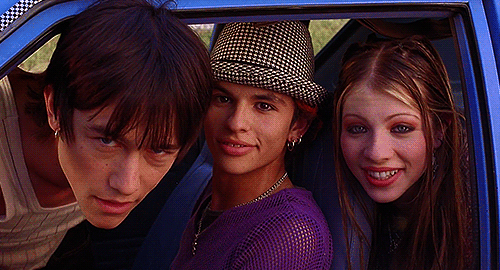
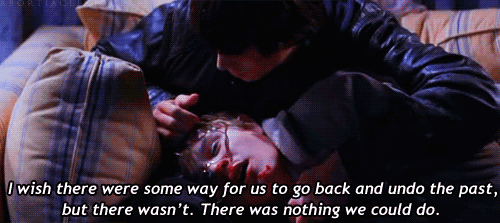
I feel that many people learn about sexuality and gender from media and films. Films give people different perspectives and learn more about what people are feeling. Although it is good for the representation of the LGBTQ community in films, it is also important for the representation to be correct and accurate. Watching films in Hollywood can influence the minds of young people. More and more shows and movies include someone of the LGBTQ community. The inclusion of them allows more people to be educated.


2 notes
·
View notes
Text
TENET (2020) - Review & Analysis
It’s hard to write about this movie without spoilers… so… fair warning… spoilers ahead. Though they don’t start til like halfway through the review.
One of my friends recently asked, “So how was TENET.” My answer: “When I read about the plot after I watched it, my mind was blown.” Therein lies the problem. This is a classic, “It’s better the second time” kind of movie, something Christopher Nolan isn’t a stranger to (I lovingly saw Inception twice in theaters and The Dark Knight a whopping three times in theaters… and both countless times since). The difference is, both of those movies were great the first time around too. They just got even better with subsequent viewings.
My personal problem too is that with rare exception (and especially as I’ve gotten older), I don’t like watching movies more than once. While there’s too much out there that I know I’ll never see, I still want to do my best and see as much as I can. Therefore, I don’t put too much credence into “It’s better the second time.” If it’s not good the first time around, I don’t care if might be better the second time.
TENET continues Christopher Nolan’s fascination with toying with time. It’s a theme and gimmick that’s been a staple since his ground-breaking major debut with 2001’s Memento, but featured heavily in both 2014’s black-hole-time-warping space opera Interstellar and 2017’s timeline jumping war epic Dunkirk. In some ways, this is Nolan’s most straightforward manipulation of time, it’s just time travel. Here, the central conceit of TENET is that scientists at some point in the distant future have figured out a way to get objects (and people) to travel backwards in time, and to do so in real time. In other words, whereas in Back to the Future, Marty and Doc flash back from 1985 to 1955 in a millisecond, in the world of TENET that time-travelling would occur only after Marty and Doc wandered about Earth for the equivalent of 30 years’ time. And, importantly, during those thirty years, Marty and Doc would exist in the same plane and realm as all other “forward-time” people. They can even interact with the world like anyone else… just the interaction would be… interesting to say the least. The backwards-time person would appear to be moving in reverse from the perspective of the forwards-time person, and vice versa.
This idea leads to the most interesting part of the movie: the visuals and effects. Characters in the movie hold guns that don’t shoot out bullets so much as just absorb bullets from environments which travel with the same momentum as if they had been shot out of a gun. Bombs that blow up a building in the world of the forwards-in-time people, are experienced as fallen buildings that spontaneously reassemble from the perspective of the backwards-in-time people. The result is a movie in which the director clearly relished the opportunity to create little clever puzzle boxes of scenes. I’m sure there are countless of YouTube videos that will happily show you why this movie is a masterpiece, and I agree from a design and plotting perspective, it was satisfying to watch many of the same sequences (a car chase, a vault heist) from two perspectives (one forward-in-time and one backward-in-time) and to notice all the little details about how actions in one timeline ultimately affected the other.
That said, my head legitimately hurt as I watched this movie. As Clémence Poésy puts it in perhaps the movie’s most famous line, “Don’t try to understand it; just feel it.” I wish I could. The temptation to try to wrap your mind around what is happening on screen is too large.
Perhaps what most threw me off (and both impressed and annoyed me) is how it deals with the central paradox of time travel. Namely, what happens when you change the past… and can you even do that? To put it briefly, it tackles this subject head-on without trying to cut corners or introduce alternate universes. Other films, like Avengers: Endgame address this issue by just explaining that each time characters go back in time and mess with the past, they are creating an alternate and parallel universe. This makes sense to me… as much as time travel can make sense that is. But the parallel universe solution means that truly whatever happened happened. The Avengers can go back in time and stop Thanos, but there will always exist a timeline where he wins.
This movie doesn’t subscribe to the parallel universe theory. It outright rejects my linear understanding of time and seems to subscribe to the same circular notion of time that was (not introduced but) made popular by the 2016 film Arrival. In this view of time travel, someone can go back in time and influence the exact same reality the live in. AND furthermore, the fact that one has traveled back in time makes it so that it has always been like this. In other words, traveling back in time erases any previous universe where one hadn’t traveled back in time. I think of it this way. Imagine someone poisons my Mom’s box of Cheerios. She dies. I manage to go back in time and throw away her poisoned Cheerios before she could eat them. In the Avengers view of things, my mom would still be dead in the original timeline, but I created a new parallel universe where she’s now alive, having never been able to encounter the poisoned Cheerios. In the TENET view of the world, by travelling back in time to throw away the Cheerios, I effectively undo the fact that my Mom was ever in danger. Though I as a time-traveller may remember my harrowing Cheerios journey, she has no memory of the experience since I went back and prevented that reality from ever happening. What this does mean though is that as soon as I time-travel far back enough to get rid of the Cheerios, there are now two of me in the world. There is one who time-travelled and one who is unaware that his Mom was ever in danger. Time-traveller-me now cannot simply return to his home and normal life… as the other-me is living his life unaware that time travel was ever necessary (creating a Prestige-like scenario where maybe the time-traveller is better off just offing themselves, and honestly I wouldn’t have minded Nolan retreading themes from that superb movie).
It’s that last part about the time traveller being unable to return to his old life that marks the biggest difference from time travel in the vein of Back to the Future. In the Back to the Future model, after throwing away my Mom’s poisoned Cheerios, I can zap back to the moment in time I initially decided to time travel, and insert myself back in the correct time (technically there could still be two of me... but we’ll ignore that for now). However, in the TENET model, you cannot “zap” back to the future. The only to go back to the point when you first went backwards is just to live that amount of time. That’s why two of the same person will have to essentially co-exist. And since the movie stipulates that two of the same person cannot come into contact, the time-traveller is likely to live a life of exile.
It’s the sort of head-scratcher that makes sense on paper (and hopefully I clarified something for someone), but when watching this stuff play out on screen it made for a very unsatisfying movie. WARNING! SPOILERS AHEAD! We as the viewer are used to seeing things as they unfold in real time. What this movie doesn’t allow us to see are the countless times various characters fail to do something and going back to undo their mistakes. Instead, we are experiencing the new reality created by past timetravellers, unaware (til the end of the movie) that they were previously realities that were erased (or prevented from coming into existence). We learn at the end of the movie that our Protagonist (John David Washington who’s cleverly named just The Protagonist… ugh) is actually the founder of the elite, global para-military force called TENET which is designed to thwart efforts by the future to erase the past. Setting aside how illogical the future’s plan is (something which the movie acknowledges… which doesn’t necessarily help matters), the reveal that The Protagonist is the original founder of TENET means that there’s a whole lot more to the plot we don’t see in the movie. The original Protagonist clearly had a long life with life events that were very different from what we see in this movie. Namely and most importantly, he at one time lived in a world without TENET. Presumably, the initial Protagonist discovers the future’s scheme and fails to stop it. In order to undo his failure he goes back in time to form TENET. In doing so, he completely erases the TENET-less reality he had actually experienced. And interestingly, the Protagonist involves his younger self in his plan for the eventual of TENET. So as I said, the Protagonist we follow in this movie is NOT the original Protagonist, but instead one who lives a reality that was manufactured by an older version himself.
What I think is crucial, (and maybe I’m dead wrong here, who knows?) but at the end of the movie when it is revealed that the Protagonistis the founder of TENET, it is implied that our Protagonist (the one we follow in the movie) will go on to do the same acts as his prior self (namely, as an old man, he will travel back in time and found TENET again). But I don’t think this is true, and it’s here I think the movie approaches time travel in a unique way. A figure has already founded TENET, so there’s no need to do that again. What’s happened, happened. In essence, the Protagonist we see at the end of the movie is free to do whatever he wants. What’s happened has already happened and the TENET-founding Protagonist has already done his thing.
What I like about that is that it avoids the weird, paradox circular shit that infects time travel fiction. Take the third Harry Potter, for example. Harry is about to get destroyed by Dementors until a Patronus spell is fired. As we discover later in the movie, it was actually Harry who cast that spell. But how is that possible? If a future Harry is the only way to save Harry… then how does he get saved the first time? Maybe there’s an alternate reality we don’t see where Ron saves Harry last second and Ron dies so Harry goes back in time to prevent that reality from happening and we just never see that. Regardless, it’s a large plot hole that is unexplainable. What I give credit to Nolan and co. for is crafting an incredibly complex time travel tale that avoids any obvious plot holes and time paradoxes. We are left with a fairly intelligent piece of science fiction. Also it doesn’t chalk it all up to, “aliens think and speak in circles so time is circular”… you know that bullshit that Arrival pulled.
That’s more than I intended to write about the plot. The point is, as I said at the beginning, reading about and discussing the plot is superbly interesting and hats off to Nolan and crew for putting it together.
Watching the plot is a different story. Nolan is needlessly confusing in this picture. The fact that reading about the story offers a great deal of clarity should be a red flag. Not that every movie needs to or should be clearly understandable immediately… but it shouldn’t be so confusing that your head hurts.
I think the most disappointing thing is that I would be willing to set aside the confusing story for the pleasure of some well-choreographed, mind-bending action sequences. While the previously mentioned car chase is one such sequence, the grand finale invasion/battle was (for me) incredibly hard to follow. Shot to show two simultaneous operations, one team moving forward, one moving backward, I had no fucking clue what was happening.
And then once we start to actually think about the characters and humans who make up this story… it’s clear more work went into designing the action/set pieces than in developing the characters. I hated… HATED John David Washington’s performance as the Protagonist. He was written to sound like a quick-quipped, witty, charming Bond-like hero, and this just isn’t the movie for that. Though a former CIA agent, he’s not in a spy-thriller. And when the dialogue isn’t a showcase to show off how witty our hero is, it is just an excuse to explain boatloads and boatloads of exposition. I’ve become a real stickler as of late for how films do this. Classically, films use a newbie character as a stand-in for the audience as an excuse for other characters to explain the particulars of the world to them. It’s a little trite, but it’s perfectly functional. What isn’t functional is what this movie does. Half of the dialogue is the The Protagonist meeting someone and them asking him a question like, “What do you know about this Russian base?” and the Protagonist responding, “That Russian base? Well it’s… blah blah blah” and proceeds to talk for a minute answering the person’s question exactly. They reply, “Correct.” And the movie proceeds. It just doesn’t do much to make me care about any characters.
And then, yes, we have to talk about it, the way Nolan’s film deals with its lone female character, Kat Barton (Elizabeth Debicki). She’s the wife of the film’s villain, Andrei Sator (Kenneth Brannagh, doing his best impression of a Eastern European maniac since the last time he did this for 2014’s Jack Ryan: Shadow Recruit… which admittedly he does a good job of). The men in this film just don’t give a shit about this woman. But that would be OK if the movie was honest about this, or in particular made the Protagonist feel guilty about how he uses Kat, discards her, and gets her unnecessarily involved in her husband’s affairs. If you can’t tell, I hated the Protagonist, which is never a good sign when watching a movie. I didn’t much like Washington in BlacKkKlansmen either, so maybe he’s just not my guy. In both movies, he seems to have a confident swagger about him that doesn’t match the characters he plays.
Robert Pattinson is in this movie too. He’s good. I don’t know. Nothing special here from him. He doesn’t detract from anything, but he’s not a great addition. Same goes for the performance from Debicki. Branagh as the villain is good. He’s a good actor even if his beard/facial hair just looked off the whole time. Maybe a larger make-up budget would have helped? At least he was an interesting character, even if deeply flawed and the movie goes a bit too far to make him sympathetic.
So it’s not the complete mess that some people say it is online, and while I understand and appreciate and really like the complexity of the plot and time travel mechanics on paper… they are certainly not a joy to watch. If you do watching, then be prepared to do boatloads of mental gymnastics or just resign one’s self to not understanding what’s happening. While I’m happy to hand-waive some shady plot points or time paradoxes from a movie, when the whole movie is a time paradox, that becomes hard to do. Alas, this is still the best Nolan film for me since Inception, but still a far cry from the highs of his 2000s run of The Prestige, Batman Begins, The Dark Knight, and Inception. If some of the character moments were better developed, this would have been a better film. Instead, really, don’t try to understand and just be awash in this time-loopy, messy, but clever film.
**/ (Two and a half out of four stars)
#tenet#christopher nolan#john david washington#elizabeth debicki#robert pattinson#kenneth branagh#time travel
2 notes
·
View notes
Text
2020’s Self Care Books for Trying Times
With Covid-19 a global pandemic that is still lingering in the air, and keeping our connections at a social distance, added how here at NYPL our librarians miss the frequent interactions with our patrons, I was contemplating on ways to keep our reading connected, our souls warm, and our health having its self care. Before google, I’d rely on the plethora of information our branches hold on any challenge in life I’d be facing. Now with a myriad of problems we can tackle, and resources we can all use to improve our lives, I wanted to tackle grounding and elevating ourselves to cope with our surroundings, than advice I can provide on financial, relationship, life goals, etc.
In this blog “2020’s Self Care Books 4 Trying Times” I’ve comprised my 20 favorite titles for the year 2020 on wellness, people’s journeys, and how health experts can help guide us to a calm and vibrant place for our wellbeing. From parenting tips, to self acceptance, coping with a mental health disorder, or even self care rituals, the need for healthy habits is a topic we all can relate and rely on to keep us striving through this winter, and being united through our current unstable climate. We should never be ashamed of our experiences, asking for help, and addressing challenges in our lives to be at peace with our pasts, content with our present, and hopeful about our futures.
What is Self-care, according to very well mind, describes a conscious act one takes in order to promote their own physical, mental, and emotional health. There are many forms self-care may take. It could be ensuring you get enough sleep every night or stepping outside for a few minutes for some fresh air.
What is mindfulness? Mindfulness refers to being in the moment. This means feeling what our bodies feel, letting ourselves think without judging our thoughts, and being aware of our environment. It is about paying attention on purpose to both what is happening inside and outside of you.
ADULT
The 7 Habits of Highly Effective People: Powerful Lessons in Personal Change by Stephen R. Covey
Topics: Professional Development, Success, Psych Evaluation
One of the most inspiring and impactful books ever written, The 7 Habits of Highly Effective People has captivated readers for nearly three decades. It has transformed the lives of presidents and CEOs, educators and parents—millions of people of all ages and occupations. Now, this 30th anniversary edition of the timeless classic commemorates the wisdom of the 7 habits with modern additions from Sean Covey. The 7 habits have become famous and are integrated into everyday thinking by millions and millions of people. Why? Because they work!With Sean Covey's added takeaways on how the habits can be used in our modern age, the wisdom of the 7 habits will be refreshed for a new generation of leaders.
Stay Positive: Encouraging Quotes and Messages to Fuel Your Life With Positive Energy by Jon Gordon
Topics: Self Help, Affirmations, Optimism
Stay Positive is more than a phrase. It's an approach to life that says when you get knocked down, you'll get back up and find a way forward one faithful step and optimistic day at a time. Start your day with a message from the book, or pick it up anytime you need a mental boost. You can start from the beginning, or open the book to any page and find a message that speaks to you. The book is a go-to resource for anyone wanting to inject a healthy dose of positivity into their life
$9 Therapy: Semi-Capitalist Solutions to Your Emotional Problems by Megan Reid and Nick Greene
Topics: Life Skills/Hacks, Self Care Rituals, Budgeting
A collection of the authors' favorite life hacks and mini-upgrades, such as craft cocktails on the cheap or tips for a perfectly planned staycation. Sometimes it takes as little as nine dollars to turn your life around. How to find simple pleasures in a pricey, wellness-obsessed world.
You Were Born For This: Astrology for Radical Self-Acceptance by Chani Nicholas
Topics: Astrology, Self Acceptance
A revolutionary empowerment book that uses astrology as a tool for self-discovery, success, and self-care from the beloved astrologer Chani Nicholas, a media darling with a loyal following of one million monthly readers.
TEEN
Teaching Mindfulness to Empower Adolescents by Matthew Brensilver
Topics: Mindfulness, Educational Guides, Learning Disabilities, Reflections
Effectively sharing mindfulness with teenagers depends on distinct skill sets . . . done well, it is incredibly joyous." Matthew Brensilver, JoAnna Hardy and Oren Jay Sofer provide a powerful guide to help teachers master the essential competencies needed to successfully share mindfulness practices with teens and adolescents. Incorporating anecdotes from actual teaching, they blend the latest scientific research with innovative, original techniques for making the practices accessible and interesting to this age group. This text is an indispensable handbook for mindfulness instruction in its own right, and a robust companion volume for teachers using The Mindful Schools Curriculum for Adolescents
The Self-Love Revolution: Radical Body Positivity for Girls of Color by Virgie Tovar
Topics: Self Esteem, Plus Size Positivity, Hygiene
Every day we see body ideals depicted in movies, magazines, and social media. And, all too often, these outdated standards make us feel like we need to change how we look and who we are. The truth is that many teens feel self-conscious about their bodies and being a teen girl of color is hard in unique ways. So, how can you start feeling good about yourself when you're surrounded by these unrealistic, and problematic images of what bodies are "supposed" to look like? This book is an unapologetic guide to help you embrace radical body positivity. You'll identify and challenge mainstream beliefs about beauty and bodies; celebrate what makes you unique and powerful; and build real, lasting body empowerment. You'll also learn how to spot diet culture and smash your noisy inner critic so you can start loving your body. It's time to create your own definition of beautiful and recognize that your body is amazing. It's time for a self-love revolution!
Out!: How To Be Your Authentic Self by Miles McKenna
Topics: Coming Out, Self Acceptance, Family Dynamics
Activist Miles McKenna came out on his YouTube channel in 2017, documenting his transition to help other teens navigate their identities and take charge of their own coming out stories. From that wisdom comes Out!, the ultimate YA guide to the queer lifestyle. Find validation, inspiration, and support for your questions big and small--whether you're exploring your identity or seeking to understand the experience of an awesome queer person in your life."
Dancing at the Pity Party: A Dead Mom Graphic Memoir by Tyler Feder
Topics: Grief Counseling, Coping with terminal illness, Bereavement. Family Estrangement
Tyler Feder shares her story of her mother's first oncology appointment to facing reality as a motherless daughter in this frank and refreshingly funny graphic memoir.
Superpowered: Transform Anxiety Into Courage, Confidence, and Resilience by Renee Jain and Dr. Shefali Tsabary
Topics: Health, Fitness, Selt Esteem.
The perfect tool for children facing new social and emotional challenges in an increasingly disconnected world! This how-to book from two psychology experts—packed with fun graphics and quizzes—will help kids transform stress, worry, and anxiety
Teen Guide to Mental Health by Don Nardo
Topics: Teens, Mental Health, Body Image, Puberty
Todays teens face and are expected to deal with a wide array of personal, social, and other issues involving home-life, school, dating, body image, sexual orientation, major life transitions, and in some cases physical and mental problems, including eating disorders and depression. This volume examines how many teens have learned to cope with and survive these often stressful trials and tribulations of modern youth.
KIDS
Turtle Boy by Evan Wolkenstein
Topics: Social Life, Friends, Relationships, School Stress
Seventh grade is not going well for Will Levine. Kids at school bully him because of his funny-looking chin. His science teacher finds out about the turtles he spent his summer collecting from the marsh behind school an orders him to release them back into the wild. And for his Bar Mitzvah community service project, he has to go to the hospital to visit RJ, an older boy struggling with an incurable disease. Unfortunately, Will hates hospitals. At first, the boys don't get along, but then RJ shares his bucket list with Will. Among the things he wants to do: ride a roller coaster, go to a concert and a school dance, swim in the ocean. To Will, happiness is hanging out in his room, alone, preferably with his turtles. But as RJ's disease worsens, Will realizes he needs to tackle the bucket list on his new friend's behalf before it's too late. It seems like an impossible mission, way outside Will's comfort zone. But as he completes each task with RJ's guidance, Will learns that life is too short to live in a shell.
How To Make A Better World: For Every Kid Who Wants To Make A Difference by Keilly Swift
Topics: Activism, Human Rights, Organizing
If you are a kid with big dreams and a passion for what is right, you're a world-changer in the making. There's a lot that can be changed by just one person, if you know what to do. Start by making yourself into the awesome person you want to be by learning all about self-care and kindness. Using those skills, work your way up to creating activist campaigns to tackle climate change or social injustice. This fun and inspiring guide to making the world a better place and becoming a good citizen is packed with ideas and tips for kids who want to know how to make a difference. From ideas as small as creating a neighborhood lending library to important ideas such as public speaking and how to talk about politics, How to Make a Better World is a practical guide to activism for awesome kids.
All About Anxiety by Carrie Lewis
Anxiety. It's an emotion that rears its head almost every day, from the normal worries and concerns that most of us experience, to outright fear when something scary happens, to the anxiety disorders, that many kids live with daily. But what causes anxiety? And what can we do about it? All About Anxiety tackles these questions from every possible angle. Readers will learn what's going on in their brain and central nervous system when they feel anxious. They'll learn about the evolutionary reasons for fear and anxiety and that anxiety isn't always a bad thing--except for when it is! Most importantly, kids will discover new strategies to manage their anxiety so they can live and thrive with anxiety
Dictionary for a better world: poems, quotes, and anecdotes from A to Z by Irene Latham
Topics: Inspiration, Self Help, Advice
Organized as a dictionary, entries in this book for middle-grade readers present words related to creating a better, more inclusive world. Each word is explored via a poem, a quote from an inspiring person, and a short personal anecdote from one of the co-authors, a prompt for how to translate the word into action, and an illustration".
I feel... meh by DJ Corchin
(E-book)Topics: Health, Fitness, Management
This series helps kids recognize, express, and deal with the roller coaster of emotions they feel every day. It has been celebrated by therapists, psychologists, teachers, and parents as wonderful tools to help children develop self-awareness for their feelings and those of their friends. Sometimes I feel meh and I don't want to play. I don't want to read and I have nothing to say. Sometimes you just feel...meh. You don't really feel like doing anything or talking to anyone. You're not even sure how you're feeling inside. Is that bad? With fun, witty illustrations and simple, straightforward text, I Feel...Meh tackles apathy—recognizing it as a valid emotion, while also offering practical steps to get you out of your emotional slump. It's the perfect way for kids—and adults—who are feeling gray to find some joy again!
Violet Shrink by Christine Baldacchino
Topics: Phobias, Relationships, Social Skills
Violet Shrink doesn't like parties. Or bashes, or gatherings. Lots of people and lots of noise make Violet's tummy ache and her hands sweat. She would much rather spend time on her own, watching the birds in her backyard, reading comics, or listening to music through her purple headphones. The problem is that the whole Shrink family loves parties with loud music and games and dancing. At cousin Char's birthday party, Violet hides under a table and imagines she is a shark gliding effortlessly through the water, looking for food. And at Auntie Marlene and Uncle Leli's anniversary bash, Violet sits alone at the top of the stairs, imagining she is a slithering snake way up in the branches. When Violet learns that the Shrink family reunion is fast approaching, she musters up the courage to have a talk with her dad. In this thoughtful story about understanding and acceptance, Violet's natural introversion and feelings of social anxiety are normalized when she and her father reach a solution together. Christine Baldacchino's warm text demonstrates the role imagination often plays for children dealing with anxiety, and the power of a child expressing their feelings to a parent who is there to listen. Carmen Mok's charming illustrations perfectly capture Violet's emotions and the vibrancy of her imagination. A valuable contribution to books addressing mental health."-- Provided by publisher.
Check out this link to a presentation by NYPL’s Children’s Librarians, Sarah West and Justine Toussaint on Mindfulness/Social-Emotional Self-Esteem Picture Book Spotlight. Featuring popular book titles in our database of the past few years promoting kids well beings!
Pre-2020 Books
Aphorism by Franz Kafka
Topics: Life Quotes, Recovery, Future Planning
For the first time, a single volume that collects all of the aphorisms penned by this universally acclaimed twentieth-century literary figure. Kafka twice wrote aphorisms in his lifetime. The first effort was a series of 109, known as the Zurau Aphorisms, which were written between September 1917 and April 1918, and originally published posthumously by his friend, Max Brod, in 1931. These aphorisms reflect on metaphysical and theological issues--as well as the occasional dog. The second sequence of aphorisms, numbering 41, appears in Kafka's 1920 diary dating from January 6 to February 29. It is in these aphorisms, whose subject is "He," where Kafka distills the unexpected nature of experience as one shaped by exigency and possibility."
This Book Loves You by PewDiePie
Topics: Life Skills, Inspiration, Food 4 Thought
A popular blogger shares humorous pieces of advice and positivity, including "Never forget you are beautiful compared to a fish" and "Every day is a new fresh start to stay in bed."
The Subtle Art Of Not Giving A Fuck: A Counterintuitive Approach To Living A Good Life by Mark Manson
Topic: Self Help, Happiness, Motivation
In this generation-defining self-help guide, a superstar blogger shows us that the key to being happier is to stop trying to be 'positive' all the time and instead become better at handling adversity. For decades we've been told that positive thinking is the key to a happy, rich life. But those days are over. 'Fuck positivity, ' Mark Manson says. 'Let's be honest; sometimes things are fucked up and we have to live with it.' For the past few years, Manson--via his wildly popular blog--has been working on correcting our delusional expectations for ourselves and for the world. He now brings his hard-fought wisdom to this groundbreaking book. Manson makes the argument--backed both by academic research and well-timed poop jokes--that improving our lives hinges not on our ability to turn lemons into lemonade, but on learning to better stomach lemons. Human beings are flawed and limited--as he writes, 'Not everybody can be extraordinary, there are winners and losers in society, and some of it is not fair or your fault.' Manson advises us to get to know our limitations and accept them. This, he says, is the real source of empowerment. Once we embrace our fears, faults, and uncertainties--once we stop running from and avoiding, and start confronting painful truths--we can begin to find the courage and confidence we desperately seek. 'In life, we have a limited amount of fucks to give. So you must choose your fucks wisely.' Manson brings a much-needed grab-you-by-the-shoulders moment of real-talk, filled with entertaining stories and profane, ruthless humor. This manifesto is a refreshing slap in the face for all of us so we can start to lead more contented, grounded lives."
Zen Pencils: Cartoon Quotes From Inspirational Folks by Gavin Aung Than
Topics: Writing Development, Expression, Quotes
Gavin Aung Than, an Australian graphic designer turned cartoonist, started the weekly Zen Pencils blog in February 2012. He describes his motivation for launching Zen Pencils: I was working in the boring corporate graphic design industry for eight years before finally quitting at the end of 2011 to pursue my passion for illustration and cartooning. At my old job, when my boss wasn't looking, I would waste time reading Wikipedia pages, main biographies about people whose lives were a lot more interesting than mine. Their stories and quotes eventually inspired me to leave my job to focus on what I really wanted to do. The idea of taking these inspiring quotes, combining them with my love of drawing, and sharing them with others led to the creation of Zen Pencils.
By: @Mx.Enigma
She/They/Queen
1 note
·
View note
Link
Chris Rock wasn’t sure if he was hiding out or not.
On the Friday before Labor Day, he was speaking by phone from Yellow Springs, Ohio, the rustic village where he’d gone to spend time with Dave Chappelle, his friend and fellow comedian. Rock had previously traveled there in July to perform for a small, socially distanced audience as part of an outdoor comedy series Chappelle has been hosting. But Rock couldn’t decide if this return visit was meant to be clandestine. “I don’t know if it’s a secret,” he said quietly. “Maybe it is out here.” He couldn’t easily find the words to describe what he’d been doing just before this trip, either. “I mean, I guess I’ve been acting,” he said. After a short pause, he added, at a more assuredly Rock-like volume: “In a pandemic.”
In August, Rock had gone to Chicago to finish filming the fourth season of “Fargo,” the supremely arch FX crime drama, which makes its debut on Sept. 27. The show’s creator, Noah Hawley, had chosen him to star in its latest story line, set in the dapper gangland of 1950s Kansas City, Mo., and which casts Rock — the indefatigable standup and comic actor — as a mannered, methodical crime lord named Loy Cannon.
Maybe in a different universe where the show premiered in April as originally planned, the “Fargo” role has already put the 55-year-old Rock on a whole new career trajectory, opening the door to more serious and substantial roles and silencing the chorus of fans who still knowingly ask him for “one rib.” Maybe in this universe it still will.
But when the coronavirus pandemic struck, production on “Fargo” was halted in March, and Rock and his co-stars (including Jason Schwartzman, Ben Whishaw, Jessie Buckley and Andrew Bird) were all sent packing. Then at the end of the summer, Rock was summoned back to set, first to spend a week in quarantine and then to complete his acting work under new protocols and not a little bit of stress.
Other prominent projects of his have also been pushed back — he has a starring role in “Spiral,” a reboot of the “Saw” horror series, whose release was postponed a full year to May 2021. But Rock wasn’t mourning the delay of any professional gratification, having spent the spring and summer realigning his values for the new reality of pandemic life. “Maybe for like a day or two, I was like, ‘Oh, me,’” he said with an exaggerated whimper. “But honestly, it was more like, I’ve got to get to my kids and make sure my family is safe.”
In that time he has also heard countless Americans echoing the lesson he offered in the opening minutes of his 2018 standup special, “Tamborine,” where he spoke humorously but emphatically about the ongoing incidents of police violence against Black people. As he said in that routine, law enforcement was among the professions that simply cannot allow “a few bad apples”: “American Airlines can’t be like, ‘You know, most of our pilots like to land. We just got a few bad apples that like to crash in the mountains.’”
Now Rock was feeling mistrustful about the power of his comedy to do anything other than entertain, and unsure when he would get to perform it again for large audiences. And he was admittedly wary about this very interview, explaining with a chuckle that when he talks to the print media, he said, “You have to be comfortable with being boring. If you’re not comfortable with being boring, occasionally, you’re going to get in trouble.”
Not that Rock was ever boring in a wide-ranging conversation that encompassed “Fargo” and his broader career; his latest observations on a nation grappling simultaneously with a pandemic and a reinvigorated longing for racial equality; the resurfacing of a past video where Jimmy Fallon impersonated him in blackface; and of course, President Trump. (“No one has less compassion for humans than a landlord,” he said.) Even in the absence of an audience, Rock was candid, increasingly animated, uncommonly nimble and always looking for the laugh. Now, let the trouble begin.
These are edited excerpts from that conversation.
Was there a time when you thought this “Fargo” season was never going to get finished and that the series might not be seen for a long time, if ever?
I’ve had weird little things in my career — I was supposed to do this Bob Altman movie, “Hands on a Hard Body.” We were on the phone a lot, going over my character and I was so excited about doing the movie. And he died. I was supposed to be Jimmy Olsen in “Superman” with Nic Cage [“Superman Lives,” which was canceled in the late 1990s]. I remember going to Warner Bros., doing a costume fitting. Hanging out with Tim [Burton], who I idolized. Like, I’m hanging out with the guy that made “Pee-wee’s Big Adventure” and he’s showing me the models of the sets for “Superman.” So yeah, I definitely thought there’s a chance this might not happen. Fortunately for everyone involved, that was not the case.
How did Noah Hawley approach you about “Fargo”?
It was a weird day, because it was the day of the Emmy nominations and I didn’t get nominated for my last special [“Tamborine”]. I wouldn’t say I was down down, but I was a little disappointed, and then I got a call from my agent that Noah Hawley wanted to meet with me.
I get acting offers, but I get more hosting offers than anything. It is not uncommon for somebody to want me to do a high-priced wedding or bar mitzvah — a few years ago, I officiated the wedding of Daniel Ek, the owner of Spotify, and Bruno Mars was the wedding band. I think I sat next to [Mark] Zuckerberg at the reception. [Laughs.] I just assumed Noah had some crazy request like that. The only reason I went is because I love “Fargo.” And I get there and he offers me this part.
How did he explain the character of Loy Cannon to you?
He said 1950s gangster, so I know exactly who he’s talking about. My father was born in 1933. It’s not like “12 Years a Slave.” It’s literally a guy my grandfather’s age.
In the first episode, we see Loy pitching the idea for credit cards to an uninterested white banker. Is he a man who wants to be part of polite society, but it doesn’t want him?
I mean, I remember having a production overall deal at HBO and I came in with one person to sell a talk show with them. And they wouldn’t. That person’s name is Wendy Williams. [Laughs.] That’s $100 million that I never made. I was selling Leslie Jones to people, to agents and managers, for 10 years before she got on “S.N.L.” I’m very familiar with selling a no-brainer that people go, “Huh? Why that?”
Is he different from characters you’ve played before, because he’s older and we don’t know how much longer he’s going to be sitting on his throne?
Yeah, it’s one of those jobs: Because of how well it pays, you could be killed at any moment. It is the best part I’ve ever, ever, ever had. I hope it’s not the best part I ever have. Hey, Morgan Freeman’s done a hundred movies since “Shawshank Redemption.” But that’s the best part he ever had.
This role feels like it’s declaring itself as being outside the realm of what you’re best known for. Are you thinking differently about your acting career and where you hope to go with it?
My casting isn’t as weird as it seems if you really watch “Fargo.” Key and Peele are in the first season and Brad Garrett’s amazing in Season 2. Hey, it’s my turn, OK? I want to work on good stuff. Everything I’ve done hasn’t been great, but I was always striving for greatness. I loved “Marriage Story.” I’d kill for something like that. [Laughs.] You see what [Adam] Sandler did with “Uncut Gems.” But you’ve got to get the call and be ready when your number’s called.
Your 2014 film “Top Five,” which you wrote, directed and starred in, was very personal for you. Do you want to make more movies like that?
That’s a vein I intend to keep going in. When I made “Top Five,” I got divorced. And like most people that get divorced, I needed money. [Laughs.] I had to pay for stuff. I also went on tour. Because of Covid, it doesn’t look like there’s going to be any serious touring until 2022. So I’m a writer-director-actor right now. I’m working on some scripts in the “Top Five” vein and I honestly hope to direct, some time after the new year.
How much of “Fargo” did you have to finish during the pandemic?
It was like an episode and a half — the whole last episode, and some scenes from the one before it. It’s weird, quarantine when you’re acting. Acting can be isolating, anyway, and then you throw quarantine into that. You’re in solitary confinement with Netflix and Uber Eats. But let’s not get it too twisted. Somebody that’s in solitary is like, shut the [expletive] up. And then to actually act and get tested every other day, and wear a mask whenever you’re not saying your lines. And be cognizant of which zone you’re in. Because for Zone A, everyone’s been tested, but in Zone B, not everyone’s been tested. Zone C is just, everyone’s got Covid.
You performed at one of Chappelle’s live shows in July. What was that like for you?
When you’re in the clubs, you learn the rain crowd is the best crowd. Any time it’s raining, they really want to be there. The pandemic crowd is really good. “Dude, not only do we want to be here, there is nothing else to do. There’s nothing else to watch. Thank you.”
What did you talk about?
I talked about our political whatever. America. Part of the reason we’re in the predicament we’re in is, the president’s a landlord. No one has less compassion for humans than a landlord. [Laughs.] And we’re shocked he’s not engaged.
Did you ever see that movie “The Last Emperor,” where like a 5-year-old is the emperor of China? There’s a kid and he’s the king. So I’m like, it’s all the Democrats’ fault. Because you knew that the emperor was 5 years old. And when the emperor’s 5 years old, they only lead in theory. There’s usually an adult who’s like, “OK, this is what we’re really going to do.” And it was totally up to Pelosi and the Democrats. Their thing was, “We’re going to get him impeached,” which was never going to happen. You let the pandemic come in. Yes, we can blame Trump, but he’s really the 5-year-old.
Put it this way: Republicans tell outright lies. Democrats leave out key pieces of the truth that would lead to a more nuanced argument. In a sense, it’s all fake news.
Looking back at the beginning of “Tamborine,” the first several minutes is you talking about police violence and raising Black children in a racist country. Does it feel futile when you discuss these issues and it doesn’t change anything?
I remember when “Tamborine” dropped, I got a lot of flak over that cop thing. There was a lot of people trying to start a fire that never really picked up. It’s so weird that, two years later, it’s right on. I remember watching the news and Trump said “bad apples.” It was like, you did it! You did it!
But you told people two years ago —
I did. But so did Public Enemy. So did KRS-One. So did Marvin Gaye. There’s something about seeing things on camera. If O.J. kills Nicole on camera, the trial is two days. [Laughs.] It’s two days trying to figure out what kind of cell he deserves. It’s just Johnnie going, [Johnnie Cochran voice] “Well I think he needs at least a 12-by-8. Can he have ESPN?” That would be the whole trial.
But there was videotape of Rodney King’s beating, too. It doesn’t assure any particular outcome.
Yeah, man. Put it this way: This is the second great civil rights movement. And Dr. King and those guys were amazing. But they knew nothing about money. They didn’t ask for anything. At the end of the day, the things we got — it was just, hey, can you guys be humane? All we got was, like, humanity. If they had it to do all over again, in hindsight, there would be some attention paid to the financial disparity of all the years of — let’s not even count slavery, let’s just count Jim Crow.
You’re talking about a system that really didn’t end until about 1973. And I’m born in ’65 in South Carolina. I’m probably in a segregated wing of a hospital — there’s no way in the world I was next to a white baby. Even if the hospital wasn’t segregated, I was in a whole other room and that room didn’t have the good milk and the good sheets. My parents couldn’t own property in certain neighborhoods when I was born. There was an economic disparity there, and that was not addressed in the original civil rights movement. It was a huge oversight. So there’s no money and there’s no land. If you don’t have either one of those, you don’t really have much.
Did you want to participate in the recent protests?
Me and my kids, we looked from afar. But we’re in the middle of a pandemic, man, and I know people who have absolutely passed from it. I’m like, dude, this Covid thing is real.
You’ve been telling audiences for years that racism isn’t going away and remains a potent force in America. Do you feel like you’ve seen circumstances improve at all?
It’s real. It’s not going away. I said this before, but Obama becoming the president, it’s progress for white people. It’s not progress for Black people. It’s the Jackie Robinson thing. It’s written like he broke a barrier, as if there weren’t Black people that could play before him. And that’s how white people have learned about racism. They think, when these people work hard enough, they’ll be like Jackie. And the real narrative should be that these people, the Black people, are being abused by a group of people that are mentally handicapped. And we’re trying to get them past their mental handicaps to see that all people are equal.
Humanity isn’t progress — it’s only progress for the person that’s taking your humanity. If a woman’s in an abusive relationship and her husband stops beating her, you wouldn’t say she’s made progress, right? But that’s what we do with Black people. We’re constantly told that we’re making progress. The relationship we’re in — the arranged marriage that we’re in — it’s that we’re getting beat less.
Jimmy Fallon drew significant criticism this past spring for a 20-year-old clip of himself playing you in blackface on “Saturday Night Live.” How did you feel about that segment?
Hey, man, I’m friends with Jimmy. Jimmy’s a great guy. And he didn’t mean anything. A lot of people want to say intention doesn’t matter, but it does. And I don’t think Jimmy Fallon intended to hurt me. And he didn’t.
There’s been a wider push to expunge blackface from any movies or TV shows where it previously appeared. Have people taken it too far?
If I say they are, then I’m the worst guy in the world. There’s literally one answer that ends my whole career. Blackface ain’t cool, OK? That’s my quote. Blackface is bad. Who needs it? It’s so sad, we live in a world now where you have to say, I am so against cancer. “I just assumed you liked cancer.” No, no, no, I am so against it. You have to state so many obvious things you’re against.
Who do you hang with these days? Who’s your peer group?
I hang with Dave [Chappelle]. I hang with my kids. I hang with Nelson George. There’s not a lot of hanging in the Covid world. The better question is, who do you FaceTime with?
So who do you FaceTime with?
The other day I realized I’ve never met an elderly person that was cared for by their friends. Every elderly person I know that’s got any trouble is cared for by a spouse or a child. Sometimes they have like five kids but only one helps. Where are your friends? Your friends are probably not going to be there when it really counts. [Laughs.] When my dad was dying in the hospital, where were his friends? My grandmother, where were her friends? Don’t get me wrong, you get sick in your 20s, your friends will come to the hospital. It’s an adventure. [Laughs.] You get sick in your 60s, they farm it out. “You go Wednesday and I’ll go Sunday.”
Enjoy them while you have them. But if you think your friends are your long-term solution to loneliness, you’re an idiot.
#chris rock#black face#amerikkka#racism#racial hierarchy#donlad trump#comedy#black comedy#comedians#black comedians#interview#interviews#the new york times#fargo fx#covid-19#covid 19#long reads
4 notes
·
View notes
Text
The Part-Time Puppeteer - Chapter 04
<= Chapter 3
Summary : Lukas has a totally normal day at work (spoiler alert: he doesn't).
Also available on AO3 : https://archiveofourown.org/works/23828971/chapters/57890368
-_-_-_-_-_-_-_-_-_-_-_-_-_-_-_-_-_-_-_-_-_-_-_-_-_-_-_-_-_-_-_-_-_-_-_-_-_-
New chapter ! I hope you'll like it ! Don't hesitate to leave a comment if you did, it helps me a lot, I can assure you !
Sorry about the drawing not being finished, my tablet is dying and I couldn't do more. I probably won't be able to draw anything for this fanfic until I either solve the problem or buy another tablet...
Anyway, happy reading !
-_-_-_-_-_-_-_-_-_-_-_-_-_-_-_-_-_-_-_-_-_-_-_-_-_-_-_-_-_-_-_-_-_-_-_-_-_-
Chapter 4 - “I’m… I’m sorry?”
Kaleb did say that Lukas was going to have a lot of work because of the auditions… But the young man really thought it wouldn’t be that bad. For several hours, the student had to do many tasks, a lot of which involving physical efforts. He wasn’t very sporty usually, so it was quite demanding for his body. All his muscles seemed to beg him to stop after a while. After all, spending a few hours moving heavy props around and building stuff was not easy for a young nonathletic man like him. When his mentor, Tom, told him he could take a break, Lukas felt like he was hearing angels singing in the background. The student stretched, feeling his joints crack at the action. Oh, he so needed that.
Lukas approached the coffee machine in the room and prepared himself a cup. He had to drink at least one cup if he wanted to survive for the rest of his shift. He looked at his watch and was relieved to see he only had an hour or so before the end of his workday.
“Thank God,” he thought to himself with a sigh. The day had been quite tiring, both mentally and physically, and the idea of just collapsing onto his bed was extremely appealing to him. Though he knew he had some assignments to finish and that he wouldn’t be able to go to sleep before midnight. Welp, this had to be expected, with his studies and the fact that most of his free time would be taken by this gruelling job.
At least, Mike had done everything to make him feel at ease. His new friend also helped him to get acquainted with the other members of the team and Lukas was really thankful for that. The other man also got to explain why his evil twin was there and it only made the student’s day even more tiring than it already was. Apparently, when the guy had learnt about his brother’s participation in the project, he had “offered” to play a role and was given the antagonist part. However, “offered” wasn’t quite the right word and Lukas guessed that MJ forced himself in the project, from Mike’s face while the latter was explaining it. In a way, his presence was a good thing for the show, since MJ was very famous, even among children. His participation in the project would only raise the ratings of the show and this was something they deeply needed for the show to keep airing. However… MJ’s attitude on set was definitely not needed.
The guy was absolutely detestable, an opinion apparently shared by most people in the team. He was like a diva, but ten times worse. Not only did he criticize most of the stagehands for things he had no responsibility in, but he was also unquestionably disrespectful and odious to everyone, even Grooves himself! The nerves this guy had! He seemed to think he was superior to every person in this room! The only one to whom he was less displeasing was his brother, though Lukas didn’t envy him. If MJ wasn’t mean to him, he was at best condescending and at worst passive-aggressive.
Lukas also had to deal with him at some point, with MJ always pointing at his mistakes and wondering aloud why they hired a student out of all people in need of a job. No need to say that the only thing preventing Lukas to punch him in the face was the money he really, really needed at the end of the month. He hadn’t noticed how patient and calm he could be until now, if he had to be completely honest.
Did this execrable actor have some quality to compensate how rude he was? Not really. However, he did know how to act, almost perfectly. The young man had to admit that, at least. If only the other’s personality wasn’t so terrible… Lukas had been admirative of MJ in the past, when he didn’t actually know him, but now, his admiration had been thrown away. Very, very far away. The question was why no one had actually talked about it on the Internet or in the news. He would have to ask Mike about that, the next time he was alone with him.
His inner monologue was cut short when he heard a knock on the studio door. Well, that was unusual, since the team members came in and out without knocking. It then opened, revealing a man in his forties, soon followed by a little girl, hand in hand. The man was wearing a formal suit, as if he had just left an important meeting. His haircut was well-groomed and while the suit made him look like a strict person, his face seemed rather welcoming.
The little girl was quite young. She probably was an eight or ten years old kid, though Lukas didn’t know much about children, to begin with. She was wearing a black shirt with a glittery pattern the student didn’t recognize from where he was and she had white sleeves underneath. She was wearing light blue jeans overalls as well as a red jacket tied up to her waist by the sleeves. Nervousness could be seen on her face as she and her (probable) father entered the room.
They were probably here for the audition. The studio was looking for children for the main protagonists. Other families had come during his shift to have an audition, though Lukas had been too busy in the backstage to actually watch them. This time, however, he hoped he would be able to during his break. Witnessing an audition in a famous studio! If he had been told that a month ago, he wouldn’t have believed it.
The family was greeted by DJ Grooves and the little girl was handed a script for the scene. Lukas couldn’t hear anything from where he was standing, but he had no problem imagining that the child was been explained the scene she was going to play. Well, she probably rehearsed it plenty of times before, though the anxiety could still make her look for her words. It was just a precaution.
The director then called MJ over. Since the latter was the only actor playing one of the main characters, for now, he had to help with the auditions. The student thought the other would see it as a chore but, on the contrary, he was way too happy to show off his acting skills.
Yep, that was it. Lukas couldn’t stand that guy.
Lukas got closer to the shooting set, hoping he could watch a bit of the audition before going back to work. He held his cup of coffee to his lips, pretending to drink it when he had actually finished it a bit earlier. At least, he would look somewhat busy.
The little girl got up on the shooting set, doing her best to remain calm and taking deep breathes. Her father was watching her carefully with a mix of worry and pride on his face. MJ, on the other hand, seemed just fine and absolutely not anxious. Well, he was used to that kind of thing, so that made sense. And then, MJ’s eyes met his and the other smiled at him hypocritically, just to mock him. Lukas replied with a glare, which only made MJ snicker.
The student hated him. So much.
The actor took a puppet which had been given to him by one of the other stagehands. He readied himself and held it as if it was floating around the child. It was a puppet representing a character with blue skin and a red long coat. His head had the form of a croissant, and its eyes were grey and red, one of them having red diamonds in it. Its fingers were sharp like claws and some fangs could be seen from the puppet’s mouth.
Woah. Creepy.
Just as they were about to start the audition, a loud noise interrupted them, just like Lukas’s train of thoughts.
The door of the room had been opened abruptly, revealing the Conductor, out of breath. His face was covered in black, as if something had exploded next to him. The student did his best not to laugh at his frustrated and angry expression and looked away, not wanting to incur the Conductor’s wrath.
-“You’re late, darling”, remarked Grooves, without his usual glamorous tone. The reproach in his tone of voice was crystal clear, though. The other director lifted his hand to make him stop talking.
-“Oh don’t pecking start, Grooves!” retorted the Conductor, with his strong Scottish accent, emphasizing his partner’s name in a hateful way. Welp, they really couldn’t stand each other, could they? The Conductor approached DJ Grooves as the latter started talking again:
-“Well, I guess someone had another accident today,” said the DJ with a mocking tone: “What was it this time? The train engine blowing up in your current movie?”
The older man took a seat next to Grooves, not even greeting the little girl and her father while doing so. Boy, this audition sure was lively… Lukas couldn’t help but hope the child wouldn’t get too distracted by it. He couldn’t imagine how he would feel in her shoes.
-“Peck off, I’m not in the mood,” warned the Conductor darkly, before taking a speaker cone next to him. DJ Grooves simply rolled his eyes and sighed, as the other director shouted a loud “action!”, still not greeting the family. Well, seemed like Lukas found another person to add in the “not having any fucking manners” list. It sure was getting long after only two days of work…
The child jumped at the loud order but quickly pulled herself together. She took another deep breath and started talking, saying her lines with a confidence Lukas would never have. She was really talented and, even if he hadn’t seen the other candidates earlier that day, he couldn’t help but think she had something. Something which made her different. The way she moved across the stage, the way she said her lines and reacted to MJ’s ones, the fake expressions on her face as she acted… She was talented. Well, Lukas didn’t know much about acting anyway, but he did know that he was really impressed at the performance. It was also easy to see that the little girl was having a lot of fun playing her role. The student didn’t think this day would be enjoyable in any way, but there was something about watching this audition that made his shift infinitely better than what it was before.
That’s why he was astounded when he heard Grooves interrupting the audition with a “cut!”. Why? The young man didn’t understand! She was skilled!
The child’s expression went from the excitement of acting to a much darker one which Lukas knew very well: a mix of anxiety, sadness and disappointment. He felt a huge heartache seeing her like this and couldn’t help but relate. “How disappointed she must be!” was all the student was able to think as he was looking at her.
However, his distress disappeared completely with Grooves’s next sentence:
-“I don’t know… There’s something bothering me with the puppet.”
The words hit Lukas like a train as a huge feeling of surprise settled over him. The… Puppet?
MJ seemed to have the same reaction as him. His eyes widened, as if he had never expected criticism in the first place, which was probably the case in retrospect. The actor furrowed his brow, confused and slightly offended at the same time.
-“What do you mean?” questioned MJ almost innocently, yet it was very easy to see that he absolutely disliked where this conversation was going.
-“Well…” Grooves thought for a few seconds and then pointed to the puppet: “I’m wondering that maybe it might be a little too scary for the children watching the show.”
MJ was about to retort something but the Conductor was quicker and added:
-“For once, I’m gonna agree with DJ Peckneck,” the name made his colleague pinch his nose in disapproval: “It’s terrifying.”
MJ remained speechless for a few moments as if he couldn’t believe what he had just heard. Well, it was true: Lukas was not a puppet specialist or anything, but it was scary as hell. The fangs, the claws, the corpse-looking skin… How could it not be creepy?
The actor straightened himself, looking around him like he couldn’t understand what was being said to him. He seemed like he was searching for someone who could back him up. Mike, who had entered the room not long ago, certainly because of the sudden agitation, noticed his brother’s distress and carefully approached the directors:
-“I-I’m sorry, but…” the lead designer gulped and tried to support his twin: “You asked for a spooky puppet, so I tried to-”
He was soon cut short by the Conductor, who glared at him:
-“Well, yeah, but look at it!” he demanded, pointing to the puppet.
Grooves agreed:
-“It is quite unnerving, darling. Can you, perhaps… Make it cuter or something?”
-“Cuter?!” MJ’s offended voice echoed in the room. His eyes glanced between the directors as he spoke again, full of sarcasm: “I’m sorry, I thought you wanted a villain, not a tea-party monster!”
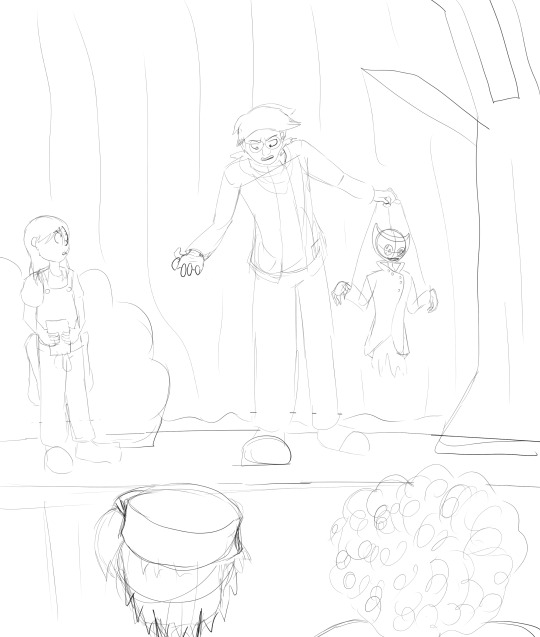
-“MJ…” Mike warned his twin, surely knowing very well where all of this was going, by the expression on his face. But MJ was not having it.
-“What, Mike? You’re going to let them criticize our work without saying anything? What are you, a doormat?”
Lukas winced at the words and felt his anger coming back full force. How could someone say that to their own brother?
All the stagehands had stopped working and were witnessing the young actor’s outburst.
Mike only remained silent, as the Conductor slammed his fist on the armrest of the chair he was sitting on:
-“That’s enough!” yelled the older director, without even needing the cone speaker to be heard all across the other side of the room.
A few moments passed with deafening silence, as MJ gave the Conductor a death stare, clenching his fists and his jaw, refusing to lose. But the other man was much more persistent than him and soon, MJ just threw the doll onto the floor with a force intensified by his anger.
-“You know what? Fine,” concluded the diva, with a faked gentle tone: “See if you can finish the audition without me, I’m done for today. Do not bother me.”
Lukas saw Mike cringe at the sound of the puppet hitting the floor. As a lead designer, the student couldn’t imagine how painful it must be to see the props you worked so hard on getting thrown away like they were just garbage.
That was it. Lukas was done taking that guy’s bullshit. He had to say something! But what if he lost his job after that? He couldn’t allow himself to lose an opportunity like this! Sure, the job was hard, but this was the only way he had to fund his studies! If he ever lost it…
His nervous and conflicted thoughts were interrupted as he saw MJ leaving the scene, stomping with fury. But as he was walking with heavy steps towards the door, one of his feet got caught up in the multitude of cables laying on the ground and he fell onwards. The actor’s face met the ground with a loud bump, resonating in all the quiet room. A quiet room which was soon filled with powerful waves of laughter. All the stagehands, even the directors, were laughing at the entitled actor’s fall. Mike, on the other hand, was the only one not laughing at all. On the contrary, the lead designer was watching his brother like one would watch a bomb about to explode. MJ lifted his face off the ground, utterly humiliated and Lukas found it absolutely priceless. The guy got just what he deserved!
And so, Lukas opened his mouth and laughed.
The actor’s face! The way he just fell down to the floor! This day had started so badly but now it was a hundred times better! Oh, he would never forget that!
He laughed for a few more seconds until he felt like something was wrong. And then it hit him like a train: he was the only one laughing now.
The student stopped immediately, closing his mouth as the realization hit him. That’s when he noticed that everyone was staring at him, their eyes widened and their face full of surprise. Oh gosh. It had happened again, hadn’t it? Lukas had laughed too loud and everyone had heard him. Instantly, he put a hand on his mouth.
The young man had always been very insecure about his laughter. For many people, laughing was something normal and easy, but for Lukas… He was absolutely ashamed of the sound and volume of his laughter. A lot of people had made fun of it at school just like many others had pointed it out to him years later.
Thus, with years of bullying and self-confidence destroyed little by little, Lukas had come to hate the sound of his laughter. And now, everyone was just staring at him in bewilderment. As for MJ, the man was glaring at him like he had never before, clenching his teeth and squinting his eyes. Oh, well, now Lukas’s hatred for the guy was mutual. Great.
The student wanted nothing more than to dig his own grave and bury himself in it. This was only his second day of work and somehow, he had managed to screw everything up again. God, what could he do to fix that? Could he even save himself from this situation? And oh, he couldn’t even imagine how MJ was going to go back at him with that… The student was not sure he would stand new hours of bullying about his laughter when he had just managed to keep his anxiety under control only a few years ago. And said anxiety was still hard to control today!
Lukas let out a nervous chuckle, glancing at the other team members, dread settling over him. What could he do, what could he do?
-“Hum… Sorry. I- uh, I’m going to go to the toilets now… Sorry again…” he mumbled, pointing to the door tensely and trying to speak as the words had trouble leaving his mouth. He had to get away, otherwise he would become a total nervous disaster. He had to get away, get away from all these people staring at him…
-“Hey, wait a second,” the Conductor’s voice arose in his back as he tried to leave, stopping him on his track. Oh God, could he get fired for laughing too loud? No, he knew it wasn’t possible, he knew how laws worked! This was just his anxiety talking! He was being irrational! His feelings were a mess and so were his thoughts.
Lukas just wanted to disappear as soon as possible. Yet, he turned back, facing the crowd of people again. The directors were staring at him with a look the student couldn’t recognize. His anxiousness intensified even more. Oh great, even more things to get scared about. He only waited, feeling like he was waiting to be given a death sentence. Finally, after what felt hours to Lukas, the Conductor started talking again:
-“Did you…” he paused, glancing between Grooves and the young man with a mix of confusion and curiosity on his face. It was strange not to see a negative expression on the director’s face. Seeing how the Conductor was looking for his words, Grooves took the reins of the discussion, though very much confused and curious as well:
-“Is that your real laugh, darling?” was the question the DJ asked him.
Lukas was mortified. He was only able to nod slightly, absolutely unmoving. In the corner of his vision, he saw MJ getting up, throwing the cables away from him furiously. When the latter looked up and met the student's eyes, there was definitely hatred in there. Yet, there was something else. And when the other started to smile, Lukas understood that he had been right: the actor would never let him forget what happened today.
He was so screwed.
The directors looked at each other, then glanced between Lukas and MJ. Wait, why were they staring at him too? The student felt like he had missed something, something huge. And when Grooves opened his mouth again, the young man was dumbfounded:
-“How about you got your chance at an audition?”
The word “astonishment” was clearly not strong enough to express Lukas’s state of mind at that particular moment. What?
-“I’m… I’m sorry?” he wondered aloud, certain he must have misunderstood something. There couldn’t be any possible way that he had been asked to try auditioning!
Grooves was about to answer but another voice interrupted him: MJ.
-“Are you kidding me?!” yelled the actor, both furious and confused: “He’s a student! He knows nothing about acting! What role would you give him anyway? A fucking tree in the background? Hah!”
MJ scoffed at his own joke, glaring both at the directors and the student in a superior way, as if he knew that he had always been right all along. But then, the Conductor answered his question, absolutely blowing MJ’s mind, just as Lukas’s.
-“We’re going to give him yours, you peck neck diva.”
Lukas felt the world turning around him. This was all a dream, right? This couldn’t be possibly happening! He was going to wake up and laugh at his stupid dream, and start his day as if nothing had happened! Because that could only be the case, right? This couldn’t be real!
But MJ’s scream, on the contrary, was very much real:
-“What?!” the actor’s voice resonated in all the room: “You’re going to do what?!” His intonation was loud and deadly serious.
Grooves was the one to reply, darkly, glaring at the young actor through his star-shaped glasses:
-“You heard us, darling,” was all the DJ had to say to shut MJ up.
A few moments passed where the latter stayed motionless, shaking from the rage he was trying to contain. In the other side of the room, Mike was watching his twin with extreme worry. And then, the bomb exploded. MJ screamed and stomped to the door, knocking all the shooting equipment on his way out, still screaming all while he did so. All the other stagehands could only stare in bewilderment, not knowing what to do. But before anyone could try to stop him, the actor stormed out and slammed the door behind him. Mike soon followed him, though it was easy to tell from his face that it wasn’t the first time something like that happened.
Lukas, on the other hand, remained unable to move, completely swamped by the events. It is only when he felt a tap on his shoulders that he came back to reality. He turned back, his face extremely pale. His eyes widened when they met Grooves’s ones. The latter was handing him a script, which the student stared, astonished.
-“We still have an audition to finish, darling. Why don’t you come help us to take it up again?”
This couldn’t be real. This couldn’t possibly be real!
But then, the student’s hand mindlessly grabbed the script and, when his fingers felt the soft surface of the paper against his skin… He knew that he was very well awake.
How did he get himself into such a situation…?
-_-_-_-_-_-_-_-_-_-_-_-_-_-_-_-_-_-_-_-_-_-_-_-_-_-_-_-_-_-_-_-_-_-_-_-_-_-
Welp, what a day for Lukas, right?
And that's when MJ's true hatred for Lukas starts :)
See you on the next chapter ! Stay safe everyone !
Chapter 5 =>
#A Hat In Time#hat kid#hailey#snatcher#lukas#The Conductor#Conductor#dj grooves#Grooves#MJ#Mike#moonjumper#puppet au#The Part-Time Puppeteer#fanfiction#my art
15 notes
·
View notes
Text
Anya Taylor-Joy Infiltrates the Boys’ Club of Chess in The Queen’s Gambit
https://ift.tt/eA8V8J
Netflix’s period piece miniseries The Queen’s Gambit spans a decade in the life of fictional chess prodigy Beth Harmon (Anya Taylor-Joy), a wunderkind whose natural aptitude for anticipating her opponents’ moves is blunted by her addiction to the tranquilizer pills with which she credits her wins. Following gawky teenage Beth through her early tournaments in the 1950s to the aloof redheaded beauty wowing spectators in Europe in the ’60s—and leaving a trail of defeated men in her wake—the seven-hour series was faced with the challenge of making every chess scene equally thrilling to enthusiasts and non-fans alike.
The key, Taylor-Joy explains to Den of Geek, was in having every single game be recognizably unique. “[Series creator and director] Scott [Frank] and I would have a lot of conversations about both the chess and the addiction scenes, and how we were going to make each of them different and each of them fresh,” she says. “Because this show is seven and a half hours, and if a lot of that is the same chess game, people are gonna wander off.”
The cast and crew imbued each chess match with specific emotion, matching Beth’s personal and professional growth, and unique physicality. For the latter, that involved bringing in chess consultant Bruce Pandolfini (who also consulted on Walter Tevis’ 1983 novel on which the series is based) and grandmaster Garry Kasparov to plan out the series’ many games down to every gambit and checkmate. Because neither Taylor-Joy nor her on-screen competitors had played much chess prior to shooting, treating the gameplay as choreography helped them pick up the moves.
“I saw the whole thing as a dance,” explains Taylor-Joy, a former ballet dancer. “I saw learning the choreography as dance, but just with your fingers.”
Costar Harry Melling, who plays one of Beth’s early rivals Harry Beltik, agrees that the authenticity was found in the tactile movements of the pieces themselves.
“One of the most important things in terms of the choreography was the feel of the pieces,” he says, “about how you take pieces—whether you slide it across the board or whether you lift it up or put it down. All of these little details [are] what makes it look like you’ve been doing it your entire life.”
“It’s like riding a horse,” says Thomas Brodie-Sangster, whose chess champion Benny Watts is known for a distinctive leather duster and laconic attitude. “It doesn’t really matter if you can ride a horse, it’s more about if you can get on the horse and get off the horse and look cool doing it. That’s what people pick up on; it shows that you actually look comfortable doing it.”
While Beltik and Benny are as fictional as Beth, the actors were encouraged to draw inspiration from current and historical grandmasters on which to base their characters’ games. “Every game in the show is based on a real game,” Brodie-Sangster says. “If you’ve got a really keen eye, you can probably recognize games from across the history of chess.” He modeled Benny’s moves after Bobby Fischer, while Melling devoted a lot of time to watching current World Chess Champion Magnus Carlsen play.
“That was really fascinating,” Melling says, “because I knew nothing about chess whatsoever—so [I was] starting from ground zero, really, working out how these people operate, what makes them tick.”
Equally important as the dance steps were the dance partners. Taylor-Joy credits the originality of each sequence to who Beth is playing at that moment in time—like Townes (Jacob Fortune-Lloyd), a hunky competitor who flusters young Beth. “The first time that Beth plays Townes, it’s the first time that she’s ever liked somebody that she’s playing opposite against,” she says, “so she wants to win, but she doesn’t necessarily enjoy seeing him crumble, which is a new experience for her.”
Taylor-Joy soon found the game as dramatic as Beth does. “For her, it is life or death,” she says. “This is her intellect being challenged, and her intellect is the only thing she has any faith in. So I definitely felt the pressure, and then—whenever she’s playing with somebody—the power high of that.”
It’s no surprise that Beth gets a power high from defeating her male opponents, as it is a very insular boys’ club into which she enters as a dowdily-dressed teenager in the ’50s. For her first match with Beltik at the Kentucky Chess Championship, Melling says, the former is very much in his element, “and then she sort of enters his sphere, and he becomes completely in awe of her talent, and he knows that she’s a better player than him. His bubble gets burst very quick.”
Though Benny saunters into their first match together, Brodie-Sangster acknowledges that there is also an immediate spark with Beth. “Her presence is a bit of a surprise, and a bit of an enigma for him,” he says. “She is very much in a man’s world and doesn’t really look like she really fits in there; neither does he, and I think there’s a kind of connection there.”
Beth grows up in the world of chess, both as an aspiring grandmaster and as a young woman. Taylor-Joy had a blast playing so many different versions of Beth, though she laughs recalling how Frank initially asked her how young she thought she could play. Fourteen or fifteen was her answer—“eight, you’re gonna have to get another actor to do that one”—and so she portrays Beth from her inelegant teenage years through to her mid-twenties.
Over the course of the series, we witness Beths who are alternately brilliant and awkward, shy and sexy, on top of the world and extremely vulnerable. “Because [the show] takes its time and because you do grow with her, you as an audience are allowed insight into why she is the way she is,” Taylor-Joy says. “You see the things that shape her, and you see her grow from it, and you understand why she’s grown in that direction.”
To move between those many phases, she would devise her own backstories for the different Beths: “She starts off walking very clumsily and awkwardly and almost side-to-side, and then I was like, ‘Oh, and this is the first time she’s ever seen an Audrey Hepburn movie’ and she starts wearing the black pants and the turtleneck and starts standing differently, if a boy’s around. And just trying on different personalities, as I think we all do, especially in that age range, and probably into our adult life. It was really fun.”
In contrast to her male opponents and love interests who inhabit the same sphere, the two key women in Beth’s life exist almost entirely outside of the chess world. Fellow orphan Jolene (Moses Ingram) shows her the ropes at the orphanage, much like an older sister, but resentment stretches between them when Beth is adopted and Jolene is left behind.
“It’s all in how they’ve grown up with each other and gotten to know each other,” says the theatrically trained Ingram of her first on-screen role and the difficult emotional history between Beth and Jolene. “I think people that truly love one another certainly get the very best, but also the very worst, of each other. When you can see someone that deeply, you can’t help but be locked in to one another.”
Complicating their relationship is the fact that preteen Jolene is the one who introduces eight-year-old Beth to the tranquilizer pills to which she immediately becomes addicted. “Jolene was just teaching her how to cope in the only way that Jolene has learned how to cope,” Ingram explains, but that simple act irrevocably shapes Beth’s approach to chess for the next decade. Initially used to “even out” the orphans’ disposition (and then later banned for their habit-forming tendencies), the pills help Beth envision a chessboard in the shadows of her bedroom ceiling at night. Taylor-Joy says she would track Beth’s mental and emotional state not just by the different matches, but by how the ghostly chess pieces appear to her: “Sometimes they’re familiar, sometimes they’re very threatening, it all very much depends on where she’s at.”
Unfortunately, where Beth is often at is relying too much on the pills to help her focus during chess games, believing herself unable to triumph when not in her altered state. Her dilemma is complicated by the fact that the tranquilizer pills come back into her life care of her adoptive mother Alma Wheatley (Marielle Heller), who initially comes off as a stereotypical ’50s housewife who can’t function without “Mother’s Little Helper.” (Though the pills go by the fictional name Xanzolam in the series, they seem to be a cousin of Azolam and other benzodiazepines.)
In the past four years, Heller has been best known behind the camera, as the director of such celebrated films as The Diary of a Teenage Girl (for which she also wrote the screenplay), Can You Ever Forgive Me?, A Beautiful Day in the Neighborhood, and What the Constitution Means to Me. While Heller had always referenced her history as an actor as “part of my superpower as a director,” she says that she began to feel like “a fraud” when directing stars like Tom Hanks or Matthew Rhys. “I started to feel like, ‘Do I even remember what that feels like, to be an actor, to be asked to do these things, to be asked to go into these certain emotional places?’”
So when Frank, a long-time friend, invited her to join the series and spend a few months shooting in Berlin, Heller saw it as the perfect opportunity to, in her words, “keep my street cred as a director who was an actor.” As a director who seeks out projects about the uncomfortable things that people don’t talk about, Heller found that Alma embodied those same sensibilities: “She’s someone who has a lot of pain in her past, and that makes her most interesting; she’s not some version of a ’50s housewife that doesn’t feel real. So much of what I try to do as a director is to tap into that thing that has made somebody the way they are.”
Despite mother and daughter’s initial friction, as Beth carves out her niche in the chess world, and Alma begins accompanying her on her more glamorous tournaments, the older woman is inspired to revisit her own long-abandoned dreams of devoting her life to a creative pursuit. “For Alma,” Heller says, “she had this dream deferred. She was somebody who wanted to be a pianist and artist and never could, and that’s a pain that I feel is very human, and I totally connected to.”
What’s remarkable about The Queen’s Gambit is that each of its female characters experiences a different and specific struggle for the time period. “Scott did that really beautifully,” Ingram says of playing adult Jolene, advocating for change during the Civil Rights movement while Beth is moving up through the ranks of the chess world. “He didn’t let us forget what point in time we were in the world—we’re in the ’60s, in the smack-dab [middle] of civil unrest, because people aren’t being treated fairly. And I loved that Jolene is out front and being a crusader, being a champion for change, when very clearly all she’s known is white people her whole life. So it was beautiful to see that she’s found herself later, in changing the world—trying to, at least.”
In that endeavor, Jolene describes herself as a radical, though Ingram also feels that the word was a fitting theme for the series overall.
cnx.cmd.push(function() { cnx({ playerId: "106e33c0-3911-473c-b599-b1426db57530", }).render("0270c398a82f44f49c23c16122516796"); });
“I think it’s radical that Beth, as a woman, is this far into the chess world at this point in time,” she says. “It’s unheard of that she’s there, and everyone’s shocked by it. It’s definitely a story of radical love, and radical faith.”
The Queen’s Gambit premieres October 23 on Netflix.
The post Anya Taylor-Joy Infiltrates the Boys’ Club of Chess in The Queen’s Gambit appeared first on Den of Geek.
from Den of Geek https://ift.tt/3lT3Wky
2 notes
·
View notes
Text
Spilling Tea On Phantom of the Opera 2004
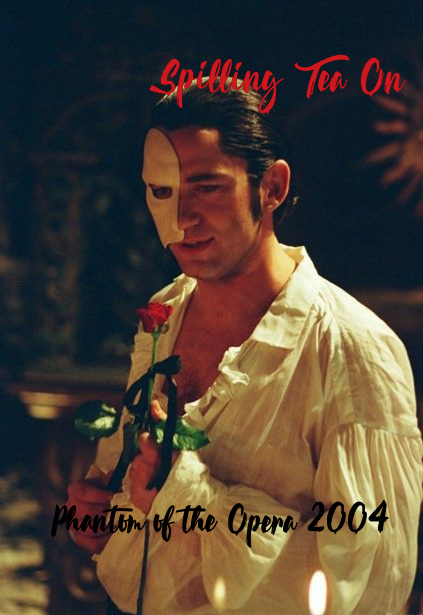
DISCLAIMER: I just want to say from the start that it is not my intention to offendanyone, you're entitled to your opinions and I'm allowed to have mine...
Ok, so, I just watched this movie a few days ago on my laptop and it was pretty much my first time sitting through the movie. I watched a few clips of the movie on YouTube but... Then, I decided to watch the whole movie. And this was my reaction.

Don't get me wrong! There WERE parts I liked but... That was just half of the movie... But overall... Um... It was meh. Ahem. Down to business!
My opinion on Gerard Butler as the Phantom? Um, wow. And not in a good way. I feel like this was a case of a talented performer being grossly miscast as the Phantom. I think this Tumblr post best describes on what I thought of his singing.
"He's supposed to have the voice of an angel, but it sounds like he's been gargling vinegar" ~Quoted by @faded-florals
Don't get me wrong. His voice is quite good for an untrained singer but... The Phantom is one of the biggest musical theatre roles of all time! It's right up there with Jean Valjean. It's really not a role that could go a competent singer, someone who's never sang professionally before but could be good once they've been trained up a bit. The role demands a truly great singer... And he wasn't right for the part.
His voice felt too strainy, growly and rock-ish for the Phantom. I didn't like how Joel Schumacher bought into the whole "sexy Phantom" thing and cast a hunky heart-throb, who was nowhere near disfigured enough. It's meant to be a gothic thriller novel with a small romantic subplot, not a B-grade vampire romance movie!
As for Emmy Rossum as Miss Christine Daae... it's true, her voice is good. She should know though, should she wish to excel, she has MUCH still to learn (Heeeeehee. Sorry. Couldn't resist.)
Emmy's Christine had little-to-no character growth and personality but I don't think it reflects her as an actress, but reflects more on the director and casting director because of how young she was (but more on that later)
Not only that, her Christine was SIGNIFICANTLY dumbed down and oversexualized. I mean, the entire point of the story is that Christine grows strong enough to overcome the trauma of an abusive relationship and make sure that her abuser never hurts anyone ever again but still shows the Phantom compassion and sympathy. I mean, her story arc is her becoming strong-willed enough to overcome the Phantom's pull/spell/enchantment/hypnosis or whatever you percieve it as on her! And don't get me started on her costumes because of the SEVERE lack of modesty.
The chemistry was a little flat because she was underage and her two male love interests were both in their 30s (which totally isn't HER fault, of course, but the directors could easily have cast someone else older)
Her voice, too, strikes me as being much too young and undeveloped. She has a very pretty, sweet-sounding quality to her singing but she doesn't sound rich and operatic enough to be a convincing Christine. Rebecca Caine and Amy Manford do the best job of singing the way I think Christine ought to sound- a maturing opera voice! Though POTO is NOT an opera (you wouldn't believe how many people actually think it is...), it does revolve around opera, and Christine is an opera singer, not a pop star.
And now onto... Everyone's favourite vicomte!!!!!!
C'mon people, put your bottles down. It is a truth universally acknowledged (or at least in the wee Raoul Defense Squad Circle) that Raoul is one of the greatest and most underrated boyfriends to ever exist in musical theatre and it's almost impossible to hate him because of how relatable he is.
Ladies, puh-leeze. He's much more relatable than you admit and face it, we all have a little bit of Raoul in us. Failure to see things staring us in the face, saying or doing the wrong thing at the wrong time, having a 'see it to believe it' attitude when we have little-to-no evidence on something... yeah, don't pretend you don't see a trend. Raoul is relatable whether we want him to be or not.
My thoughts on Patrick Wilson as Raoul, he was one of the few redeeming qualities of this not so great movie. Yeah, the swordfight and Tarzan leaps were a little too much but can you blame him?! And though I feel like that foppish wig made him look more like a magic elf prince than a vicomte, he couldn't control that!
His Raoul was so gentle and caring! Yeah, his acting was a bit stiff but at least his voice wasn't a chore to listen to, it has this warm, tender, comforting quality to it which suits Raoul. I really loved the way he sang "Don't throw away your life for my sake" and "I fought so hard to free you" in the Final Lair (😭😭😭) It feels like Raoul is genuinely apologising to Christine.
I know, I know... The Hadley Fraser fans are approaching with menacing expressions as we speak but let me clarify. I still think Hadley is amazing but... His Raoul kinda felt a little too shouty for me and his Raoul was closer to the LND-canon than POTO-canon (not his fault though).
Miranda Richardson (aka. Rita Skeeter) as Madame Giry is kind of weird. I mean, I know Madame Giry's supposed to be a little Strange and Mysterious. But this Mme. wasn't really Strange or Mysterious at all, or even slightly Spooky at all. She was just kind of an oddball. Popping up in random places to give warnings about the Phantom and looking at people as if she were questioning their life choices or something. As for her daughter... well, Jennifer Ellison's Meg was so-so. She's got a sweet-sounding voice and that added scene where she looked for Christine in the lair was a nice touch... But... Her Meg was kinda forgettable and uninteresting. Meg is supposed to prance around shrieking that the Phantom of the Opera is here, not whisper it in a blase manner that you half expect to be followed up with, "by the way, what's for lunch?" Not to mention, she rivaled Christine as far as low-necked costumes went.
Minnie Driver as Carlotta was spot on! Yes, I know she didn't sing the score but her acting was alright. She was very over-the-top and self-centered, which is great for Carlotta, but I felt her portrayal was a little too childish to be accurate. Carlotta is a successful middle-aged diva who's willing to scream and storm when she doesn't get her way, but she isn't a two-year-old pouting and throwing tantrums. (Yes, there's a difference.)
Ciaran Hinds and Simon Callow played Firmin and Andre, respectively. Their managers kinda felt like twits and nothing more. Also, Firmin's masquerade costume was ridiculous. The stupid kind, not the funny kind. ...Well, okay, it was a little funny.
I'm not going to touch on every song here, but I will say that "Hannibal" was beyond awful (if you thought the costumes in the stage version were a bit risque, you should see the movie ones- no, actually you shouldn't) and that "Think of Me," while very nice, was not particularly memorable. Christine's dress, however (despite its less-than-ideal neckline) was GORGEOUS, even though it looks completely out of place in a musical that supposedly takes place in ancient Alexandria.
"Little Lotte" kinda lost its charm by being spoken instead of sung. And Gerard Butler's voice in "The Mirror" was too rough and raspy for my ears and made me cringe in sympathetic shame. The title song was like a cheesy, campy B-grade horror movie tbh, trying way too hard to be spooky and chilling ("ooh, look, Phantom's Lair! It's DARK and SCARY down here!") and succeeding only in being cringeworthy. Not that I've actually ever seen a bad horror movie- or any horror movie at all, for that matter. Unless you count this one.
Christine's costume, too, annoyed me no end. She was basically wearing a corset and drawers under the dressing gown. *facepalm* The dressing gown is supposed to go OVER your COSTUME to keep it CLEAN, peeps. It's not a BATHROBE. And the amount of eye makeup she had on would terrify a raccoon. Yikes.
Though I liked the random horse because of its nod to the Leroux novel.
"Music of the Night" was so blah-slash-touchy-feely that it made me summarily uncomfortable.
I'd like to be able to say something nice about "I remember/Stranger than you dreamt it" but I have none. One thing that bugged me to no end was how Christine is no longer wearing stockings, like dude, that gives some GROSS implications. Anyways, let's skip to Il Muto!
Oh, but first I should say that "Notes" was rather a flop and that "Prima Donna" is unmemorable and indeed should probably be fast-forwarded as there's a rather unsavory bit involving a crew member showing the audience what he thinks of Carlotta's behaviour.
"Il Muto," I must say, was pretty doggone funny. Carlotta's "Your part is silent. Leetle toad," cracked me up into a bunch of giggling little pieces, and the little vignette of the Phantom tinkering with Carlotta's throat spray made her croaking later on a lot more believable.
Now for "All I Ask Of You", SQUEEEEEE!!!!!!!!! I honestly can't understand how anyone could listen to this song and still maintain that Christine and Raoul don't belong together. He represents everything she needs- stability, protection, a guiding hand and affirmed affection. She represents everything he needs, in turn- someone to show affection to and his childhood friend.
One thing I definitely think could have been left out was the scene in which Erik kills Buquet- we totally did not need to see him being chased, terrified, through the rafters and finally strangled. Gross.
And the Phantom and his rose crouching behind that statue... I think this was supposed to be sad, but there was too much snot mixed with tears for it to be sad. It was, again, gross. So was Gerard Butler's pathetic attempt at the "all that the Phantom asked of you" line. And the lack of a chandelier crash in that scene made the song anticlimactic.
And "Masquerade" was so-so but... The Phantom's entrance is anticlimactic somehow, and his Red Death costume (if indeed it's supposed to even BE the Red Death) is unimpressive. I don't like how Raoul just runs off to desert Christine as soon as things start looking ugly (yes, I realize he was going to get his sword, but still... something could have happened to her while he was gone. Duh, did this guy learn anything from "Little Lotte/The Mirror"? Just sayin)
As for Madame Giry's flashback immediately following, I like how it gives us some of the Phantom's backstory, but it seems really abrupt. You don't even realize until she's done that she was talking to Raoul the whole time- it sounds like she's just randomly reminiscing about Stuff, and if you didn't know the story you might be sitting there thinking, "who is this strange woman again?"
Also, Christine leaving wherever-it-is at, like, five in the morning to go to who-knows-where, completely oblivious to the fact that the Phantom is driving her. Whaaaaaaaaa? How'd he know she was planning to go for a graveyard stroll? Was he watching her through the mirror again? THAT'S JUST CREEPY.
"Wishing You Were Somehow Here Again" was rather mediocre and dulled down the fact that it is a Christine Empowerment™ song. Why, exactly, does Christine's father have the biggest monument in the cemetery? If he were a rich and famous violinist as his crypt seems to suggest, why on earth was his daughter struggling along as a chorus girl taking free music lessons?
The swordfight... Well... I had mixed feelings about it. Sword fights are all well and good, but... The swordfight takes away the element of mysterious danger to the Phantom. Okay, fine, Christine getting Raoul to spare the Phantom's life is a nice touch, I guess, but did it strike no one else that his "now let it be war upon you BOTH" makes absolutely NO sense after that? If she just saved his life, why would he suddenly be all, "thanks, but no thanks, I'M GOING TO MURDER YOUUUUUUUUUU"?
And "Twisted Every Way" was after "Wishing" which made ZERO sense. Plus, I didn't like how they cut most of it because in the musical, it gave Christine a spine!
"Point of No Return"? Hooooooo boy....... There are so many things wrong with this number. Let's just a list a few.
*HOW did no one recognise the Phantom through his "disguise"?! At least in the stage play, it made more sense because of how he was wearing a cloak that obscured most of his body.
*Christine's sleeves falling down over and over again were REALLY annoying.
*It was just too touchy-feely for my taste.
*The fact that Emmy Rossum was a teenager during filming made this scene gross because of the way they oversexualized Christine in this scene.
*Gerard Butler's voice in that scene made me cringe and shake my head in sympathetic shame.
*In the stage play, Christine ran from him, showing her own agenda and resistance to his pull! While in the movie, she didn't resist him!
*Now for the one that took the cake... The disfigurement! Or it would be a disfigurement if it actually made him look, y'know, deformed. Instead, as several people have put it, he looks like he got a bad sunburn or something. It's really rather pathetic. It makes him look more like a drama queen than he already is! Yeah.... I really don't like this movie.
On to... Final Lair!!!!!!!! It was a flop. From Raoul's whining and flailing around and his stringy hair flopping about (shallow complaint, I know, but it's so ugly) to Christine's sappy melodramatic "don't make me choooooooose" faces to the Phantom's prancing around with his ropes and maniacal laughter that somehow wasn't really scary at all... yeah, it was a flop. A major, major flop. And though The Kiss wasn't all that bad, all I could think of was, "She's SIXTEEN! SIX! TEEN! THIS IS CREEPY, DISTURBING AND GROSS!"
Which is why it's so difficult for me to admit that, um, I... cried at the end.
I COULDN'T HELP IT GUYS HE WAS ALL ALONE THERE IN HIS LAKE WITH HIS MONKEY AND HIS SMASHED MIRRORS AND HE WAS CRYING AND IT WAS SAD.
And then that rose on the gravestone? That single red rose? And the look on Old Raoul's face (still Patrick Wilson, by the way, under all that makeup) when he saw it and realized he wasn't the only one visiting Christine's grave? Yup, I lost it again there, too. And I really didn't want to. Because I tend to cry over movies I love, y'know? And I didn't love this movie. At all
Yet I still cried at the end. I'm not really sure why. I think perhaps it had something to do with the way the story still "got" me, deep down inside, despite the lousy casting and less-than-perfect singing and ridiculously unnecessary elements that totally didn't need to be there. It's still a tragically beautiful romance, and even a bad film can't kill that.
In conclusion, I think Mary Poppins can best express what I thought of POTO 2004.
In conclusion, I rate it a 2.7/5
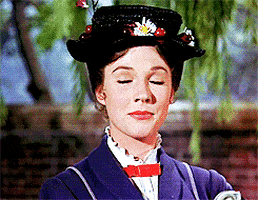
#Grace spills tea#grace speaks#poto 2004#phantom of the opera musical#phantom of the opera#the phantom of the opera#Phantom of the opera 2004#movie review#my reviews
17 notes
·
View notes